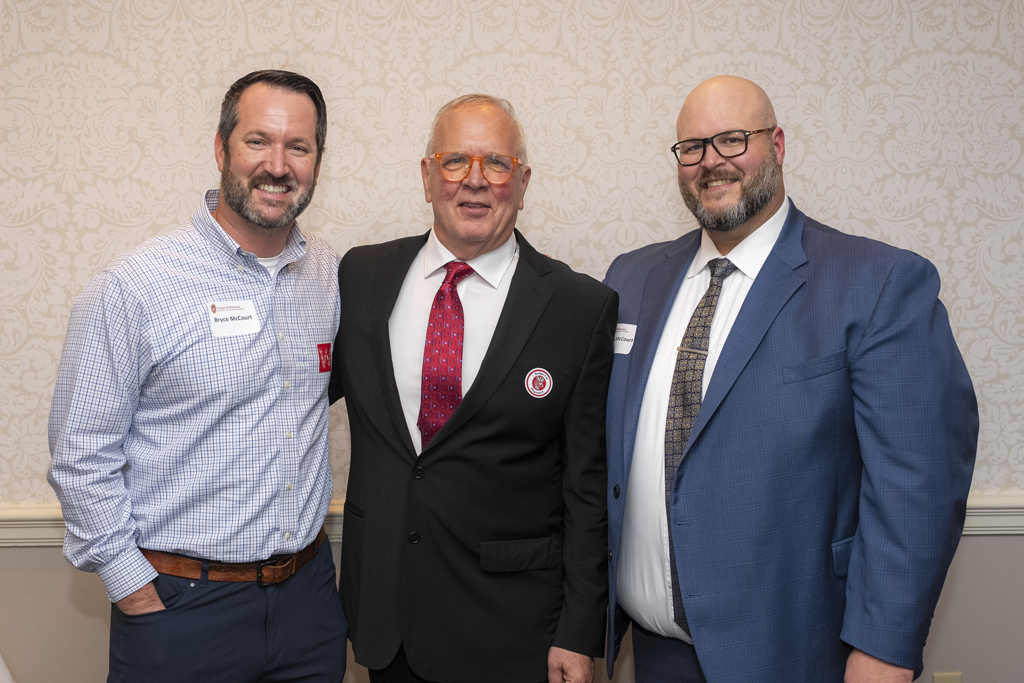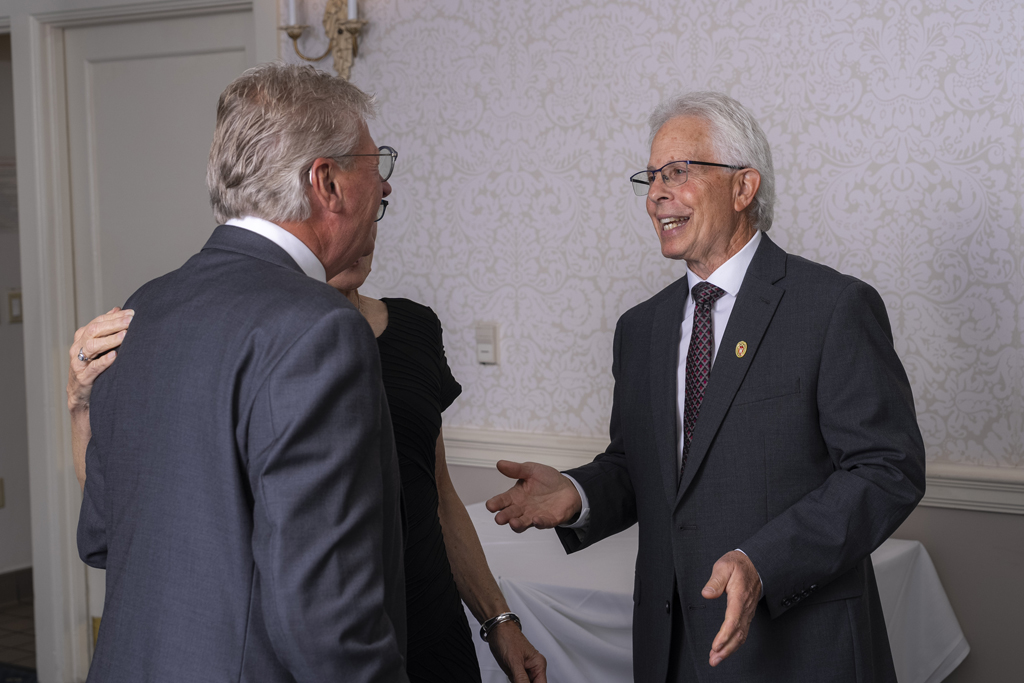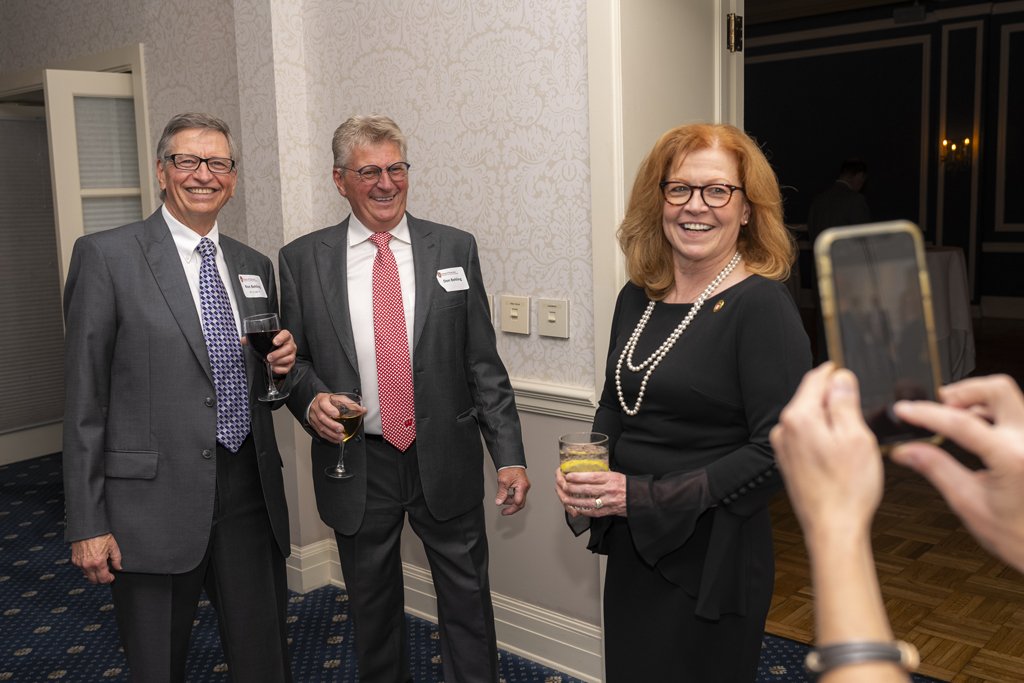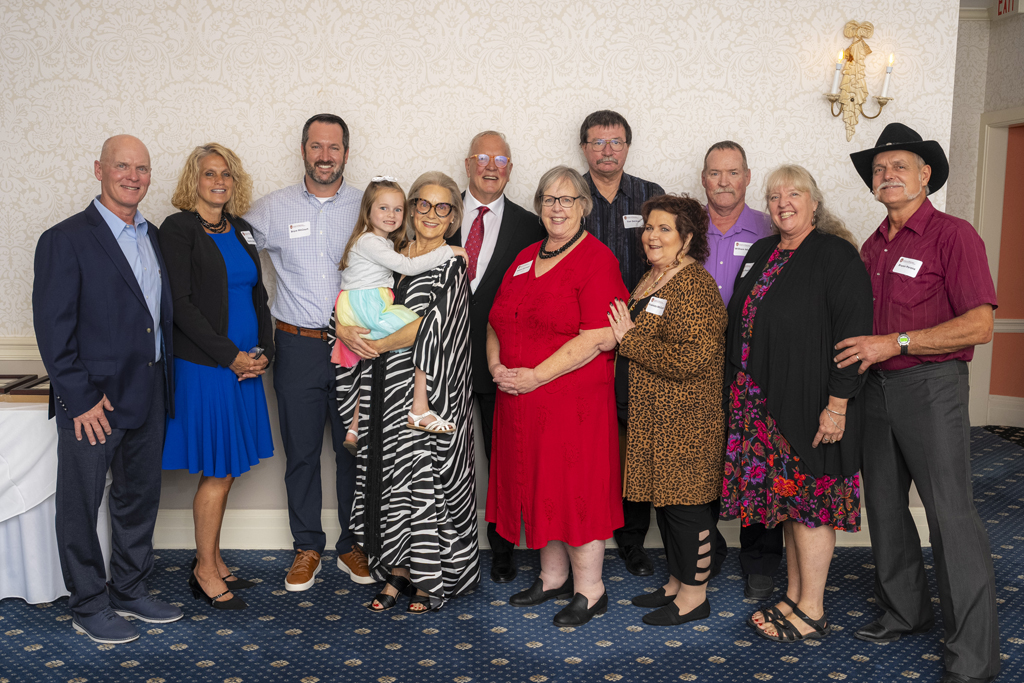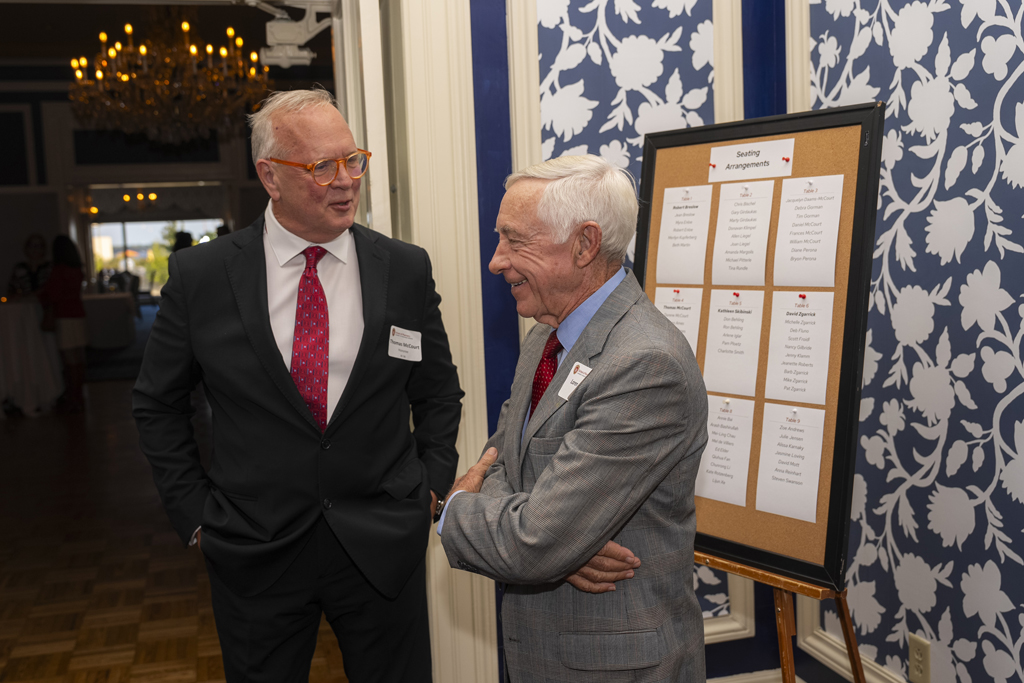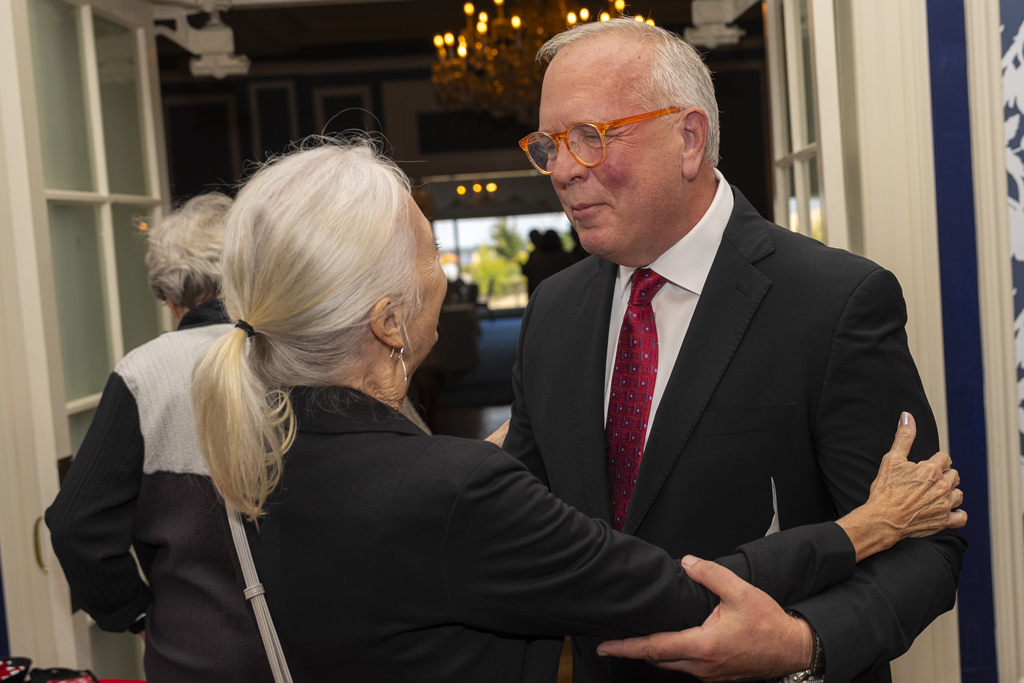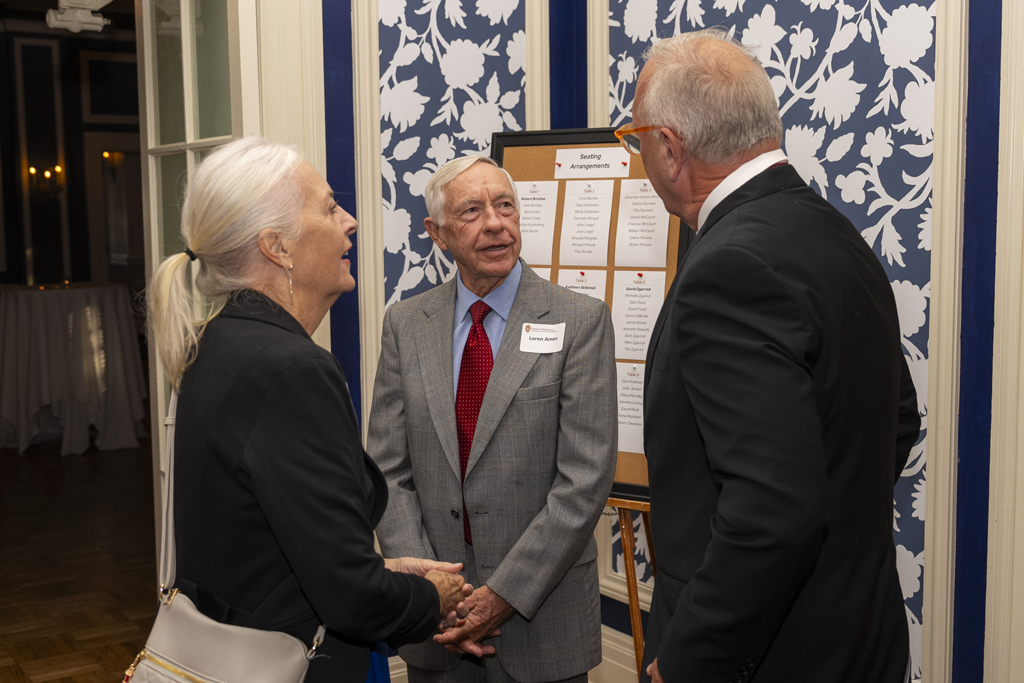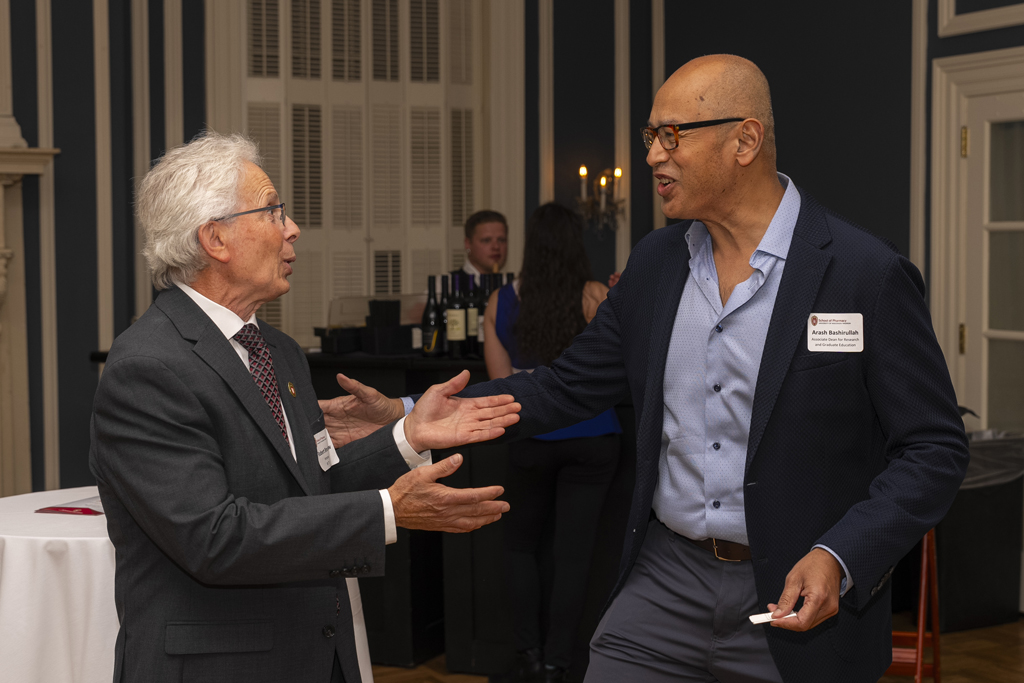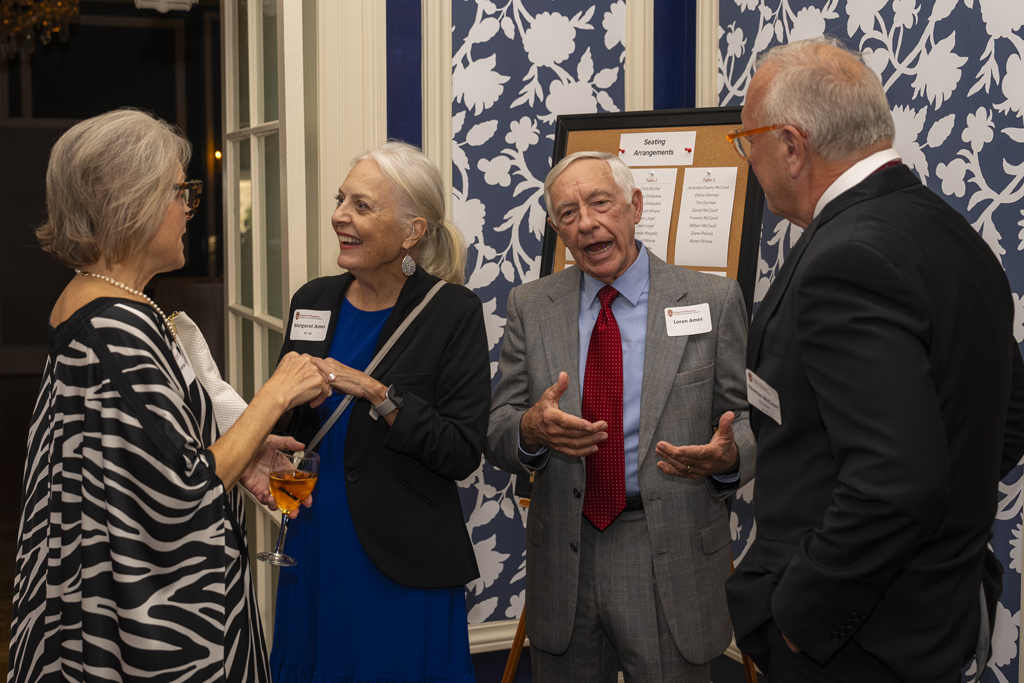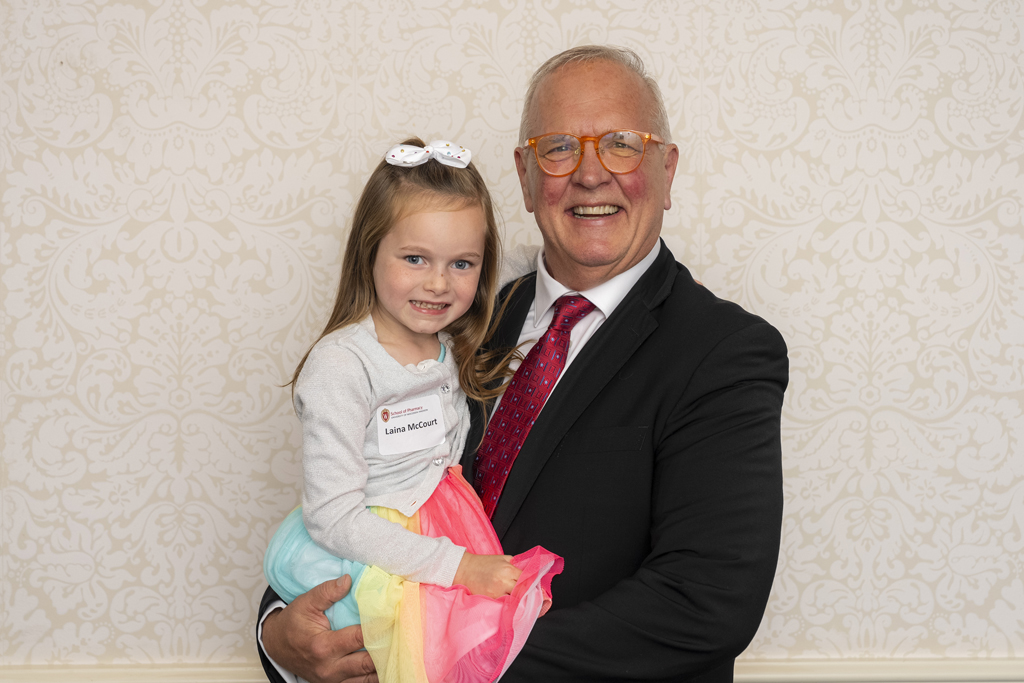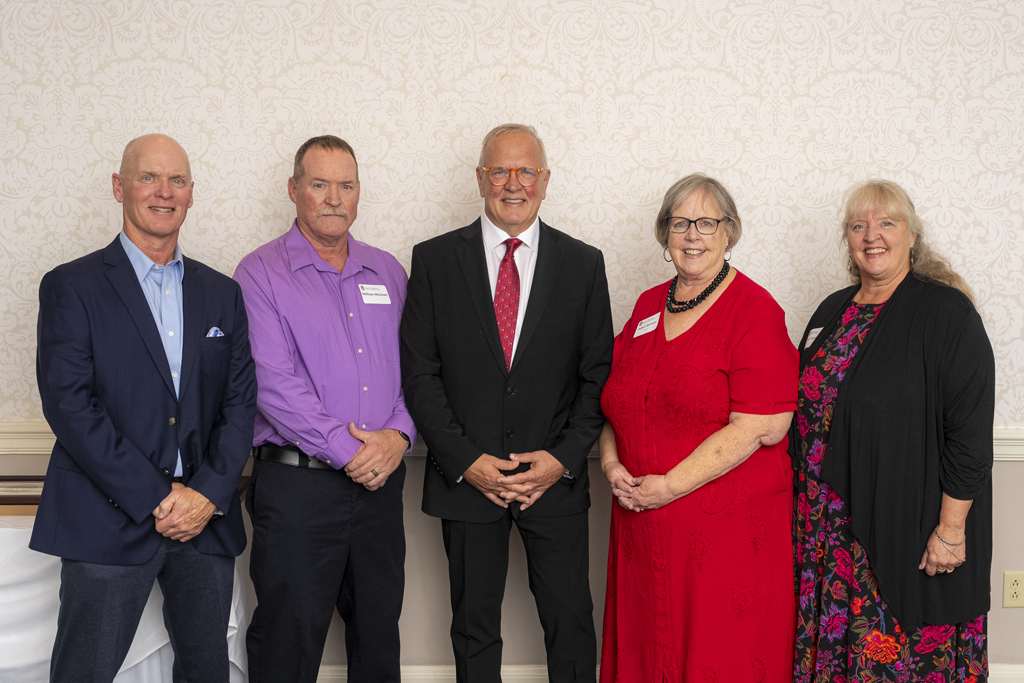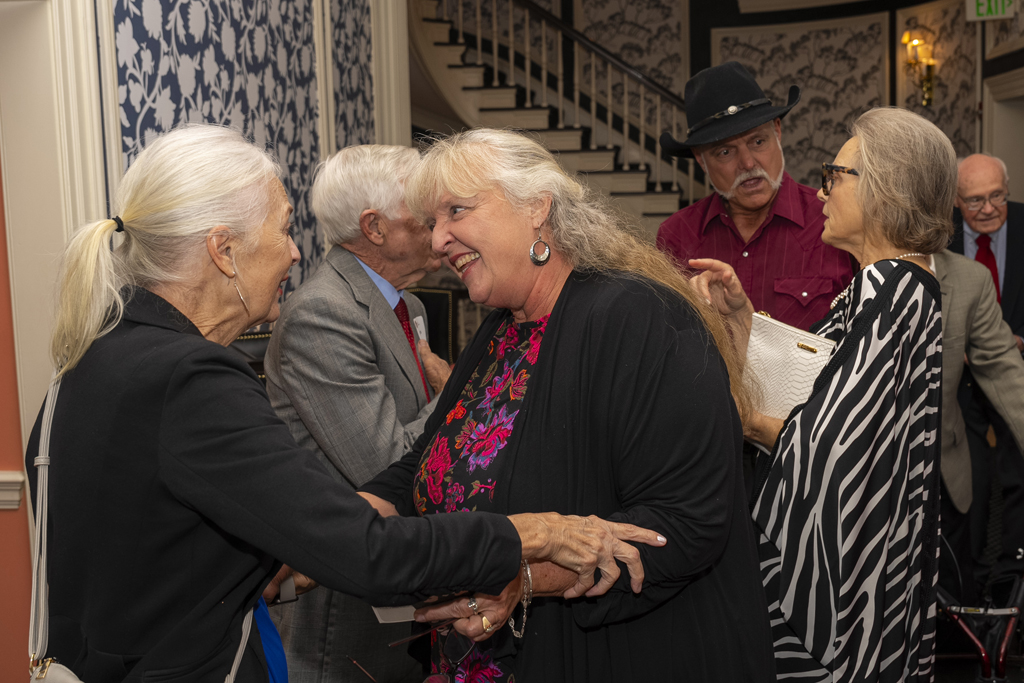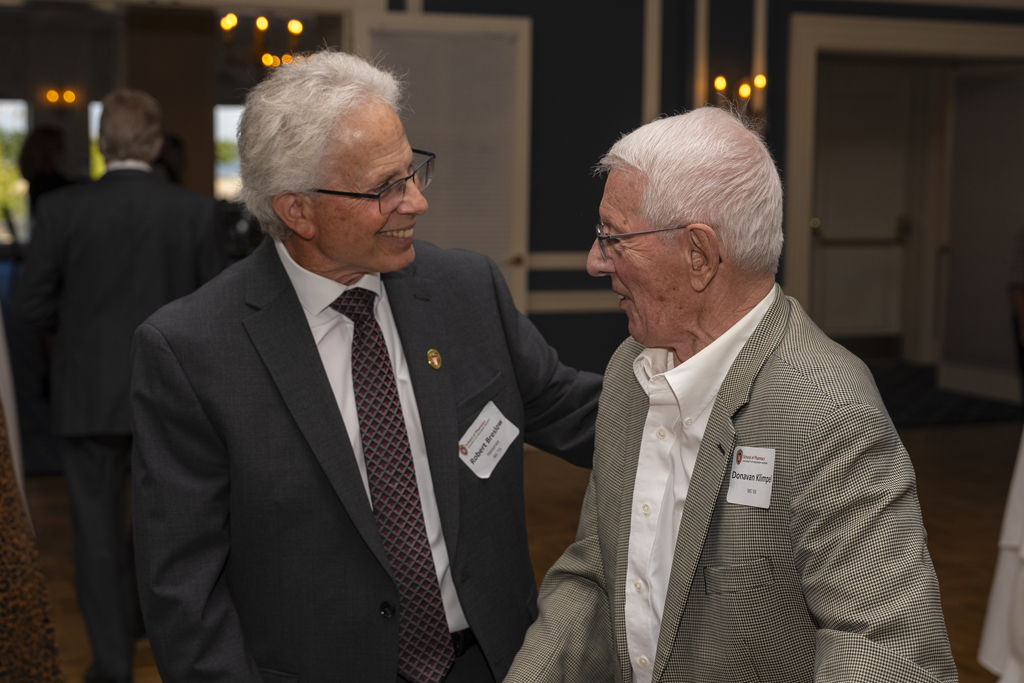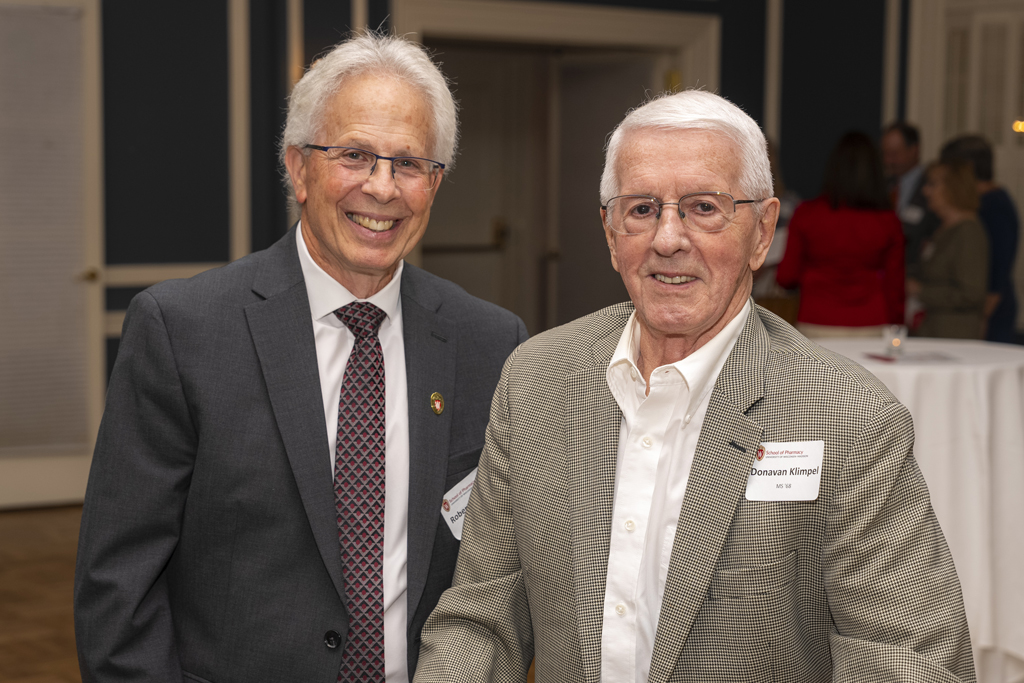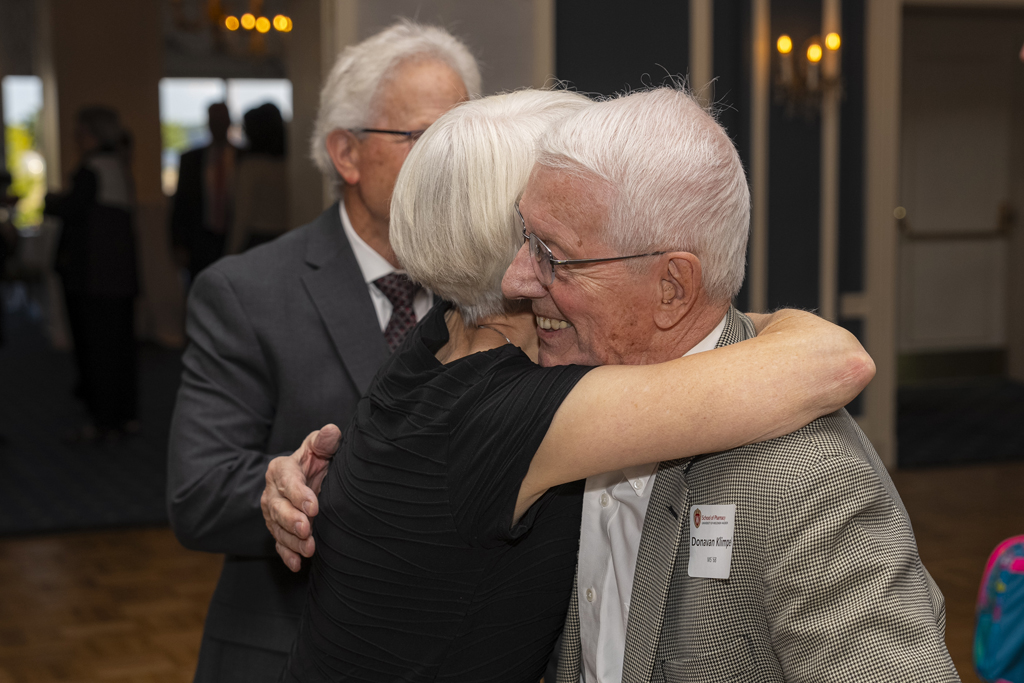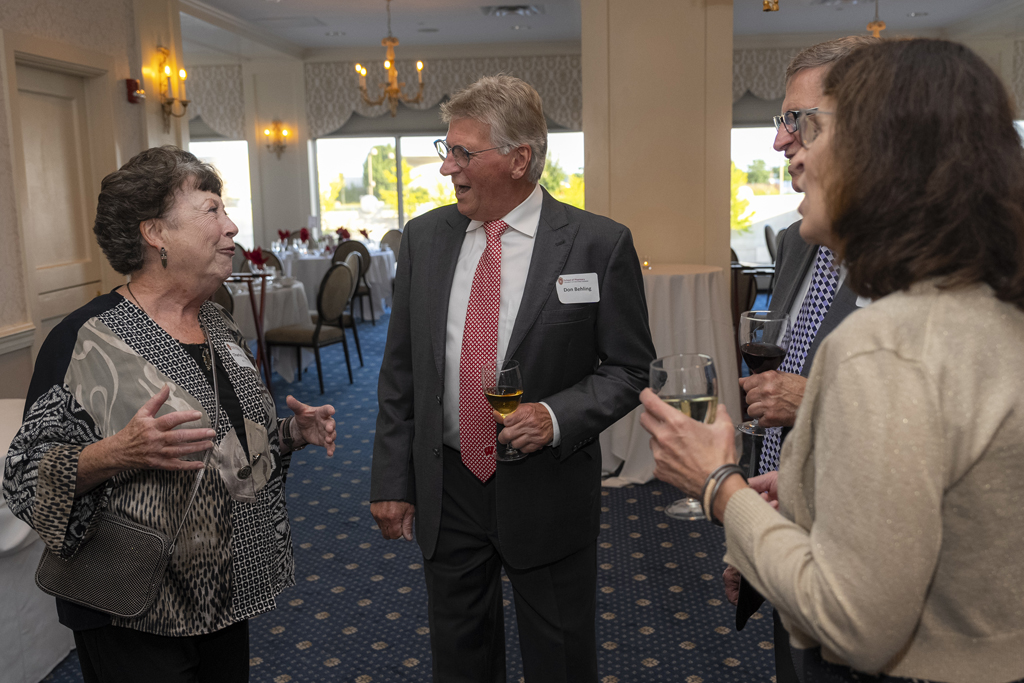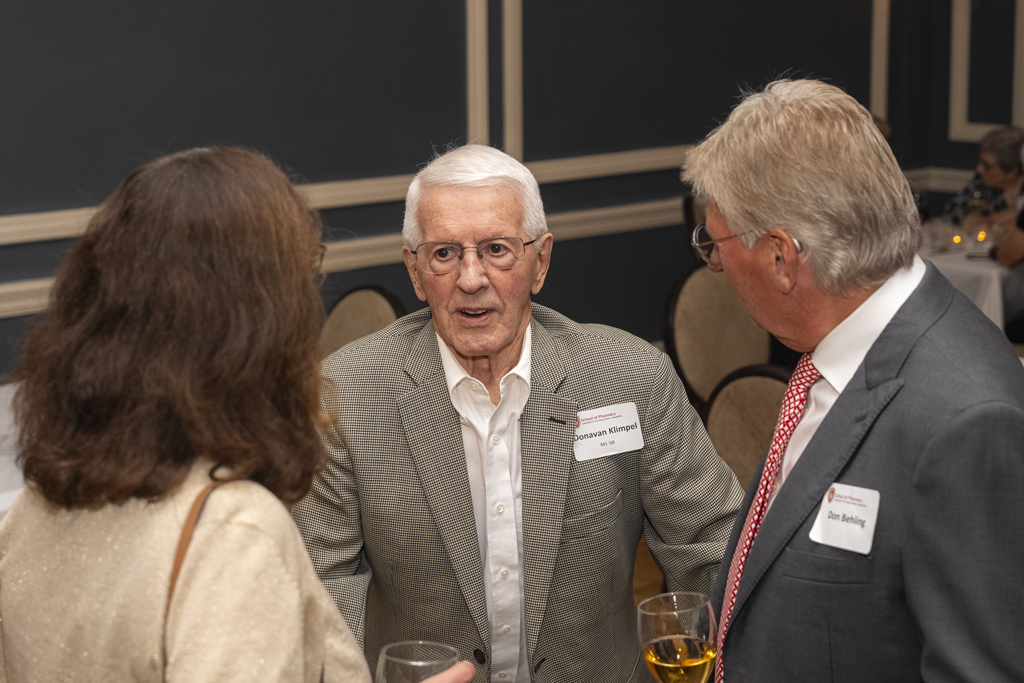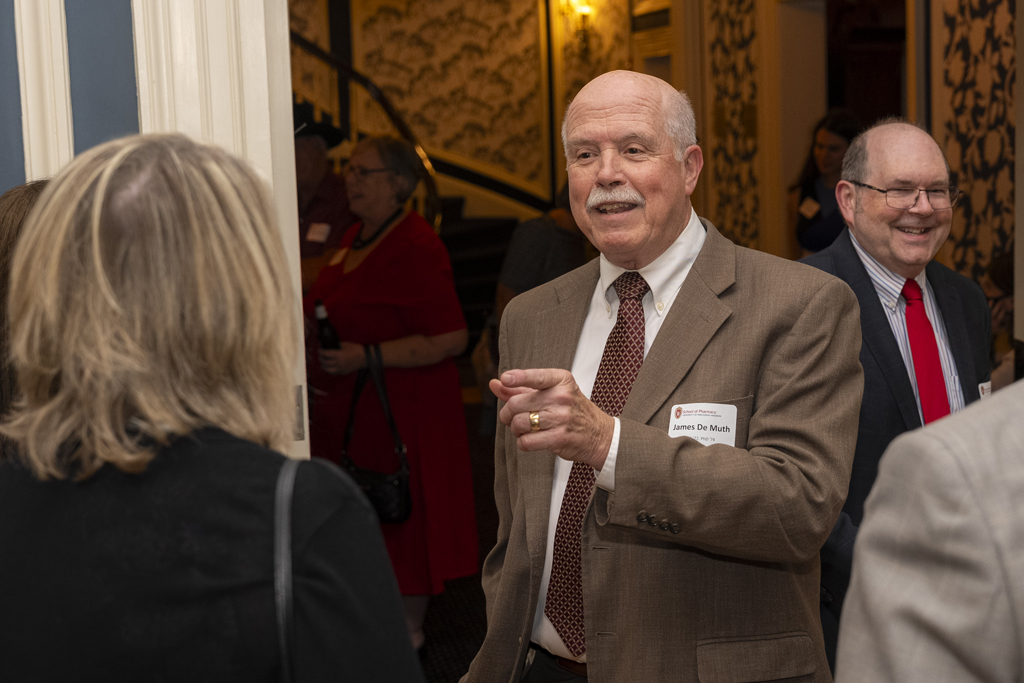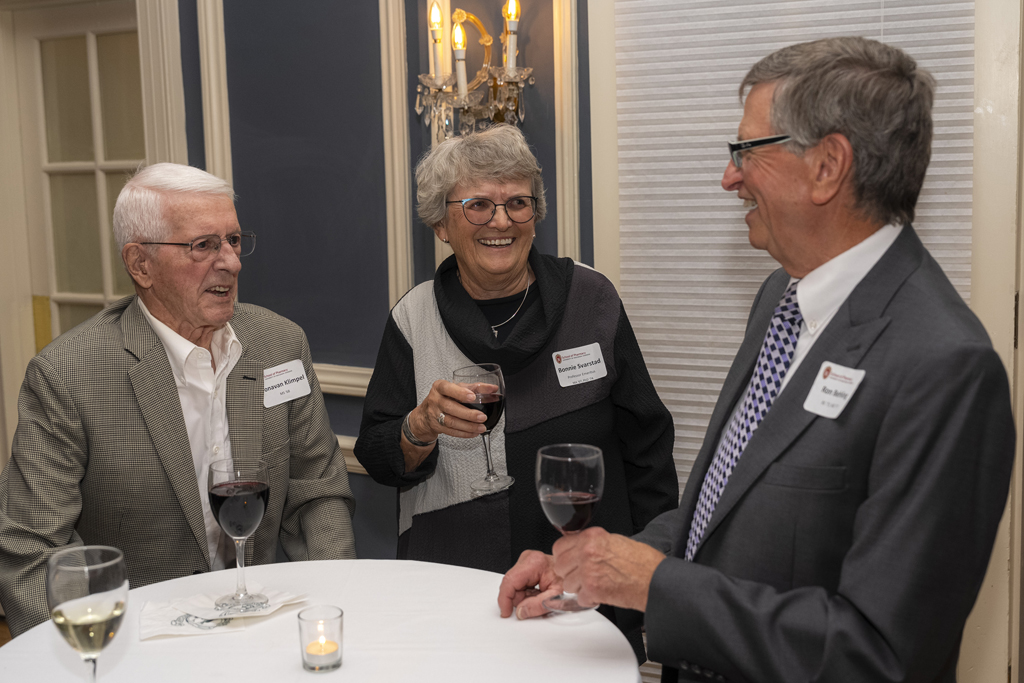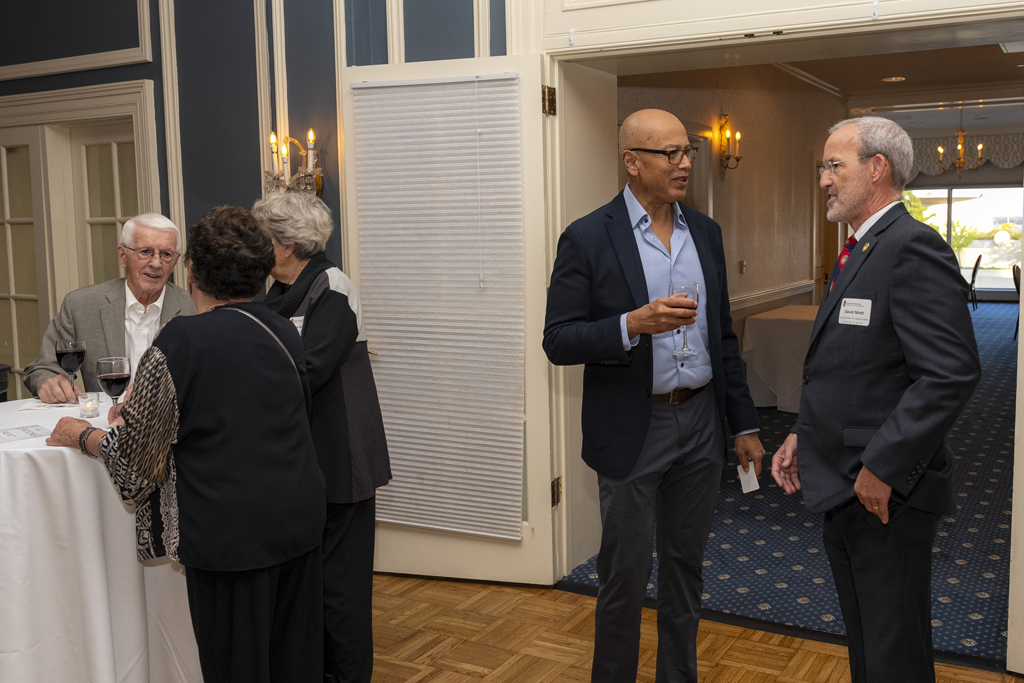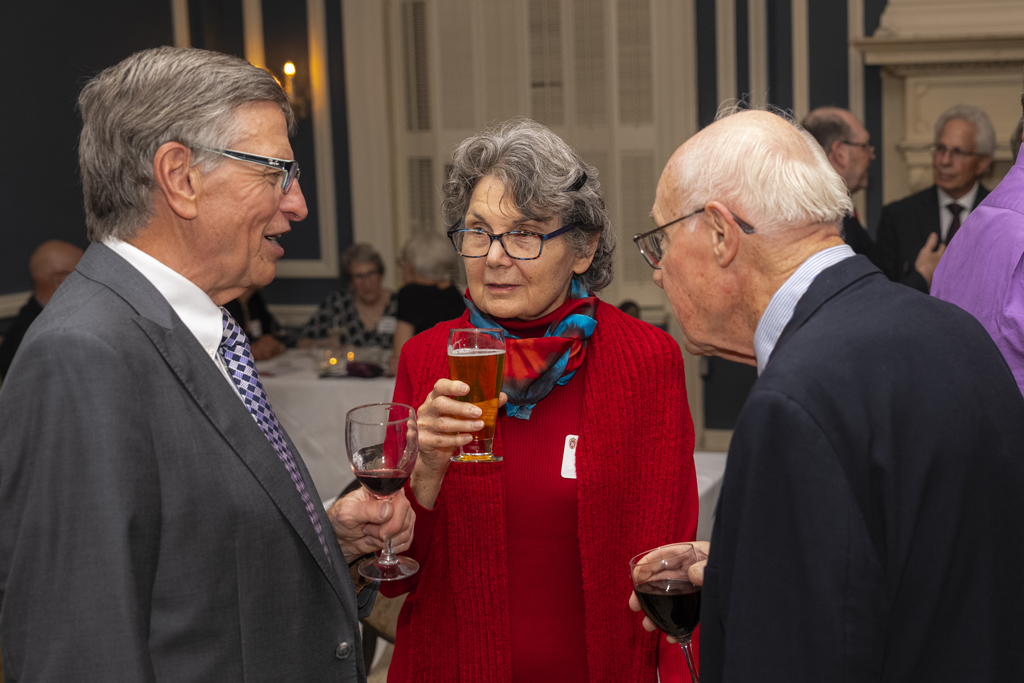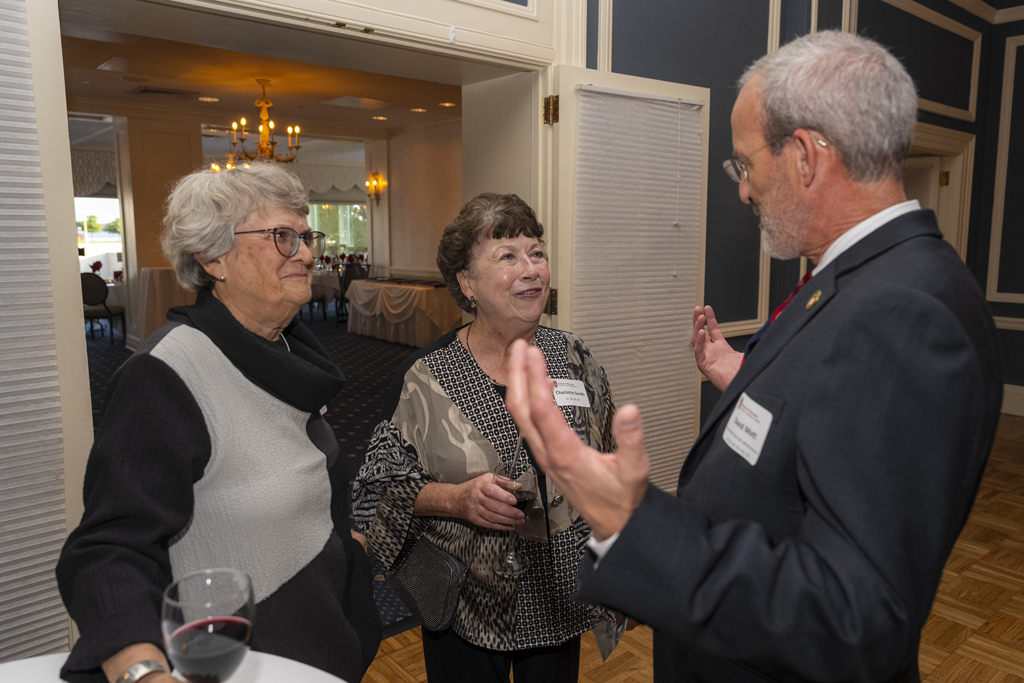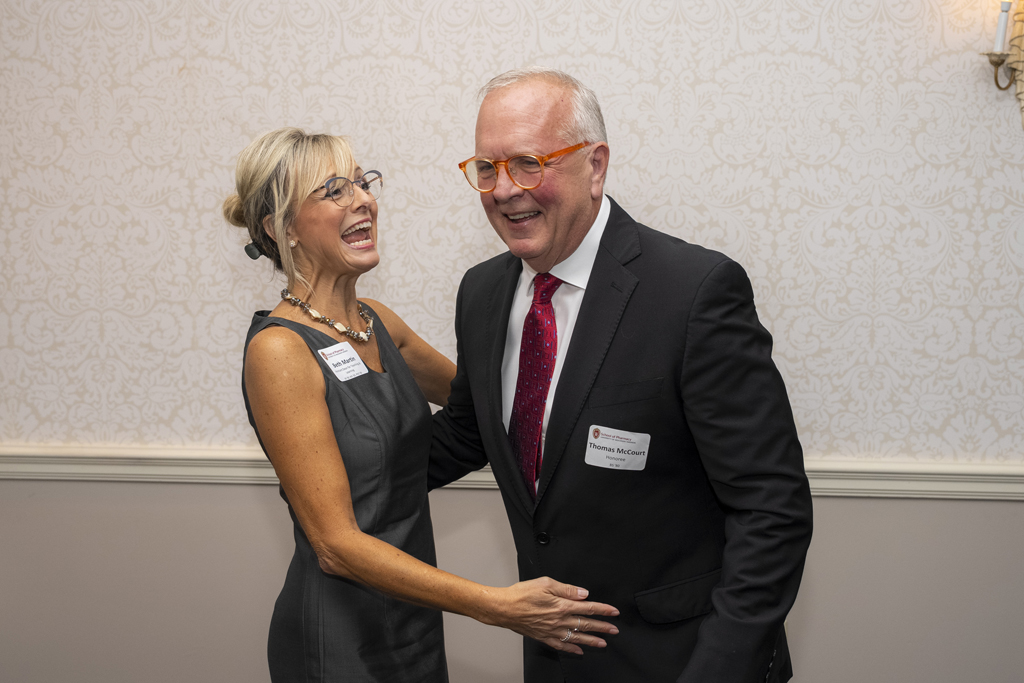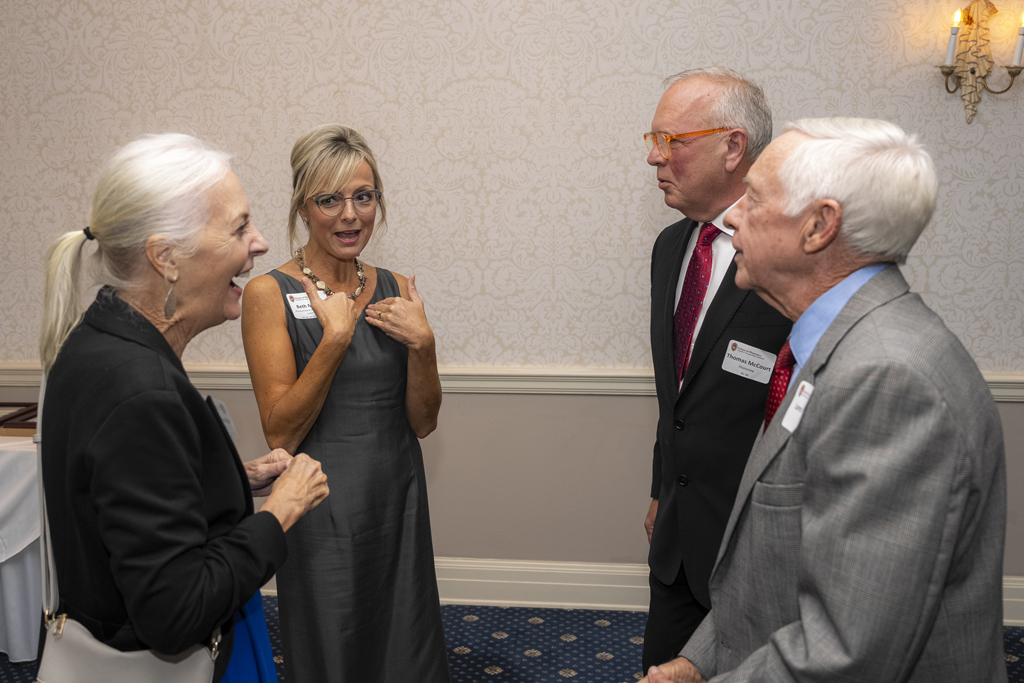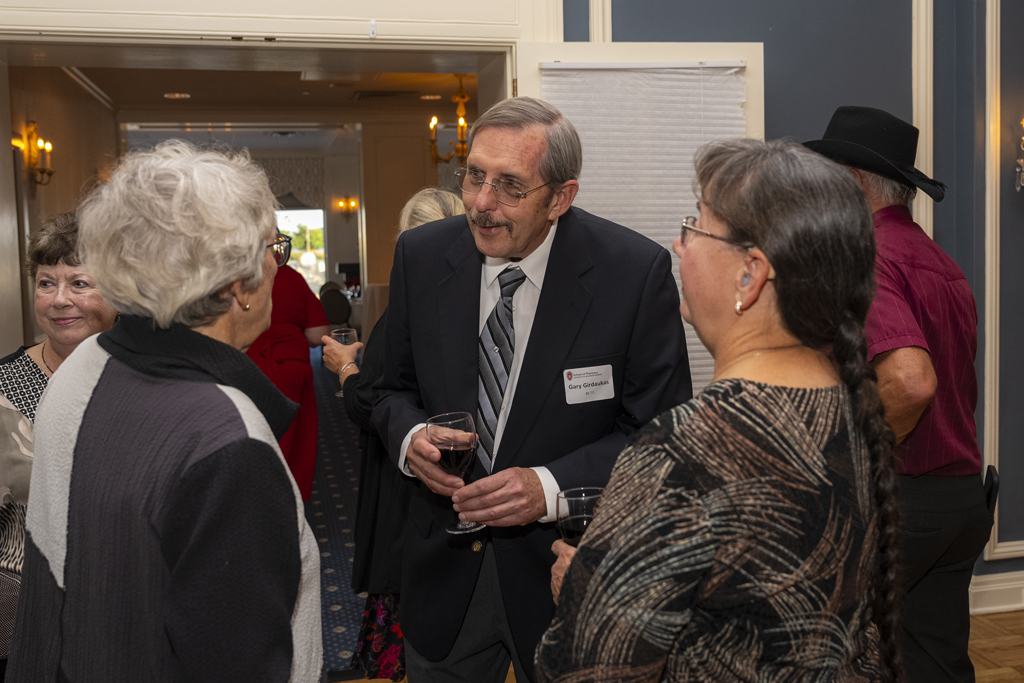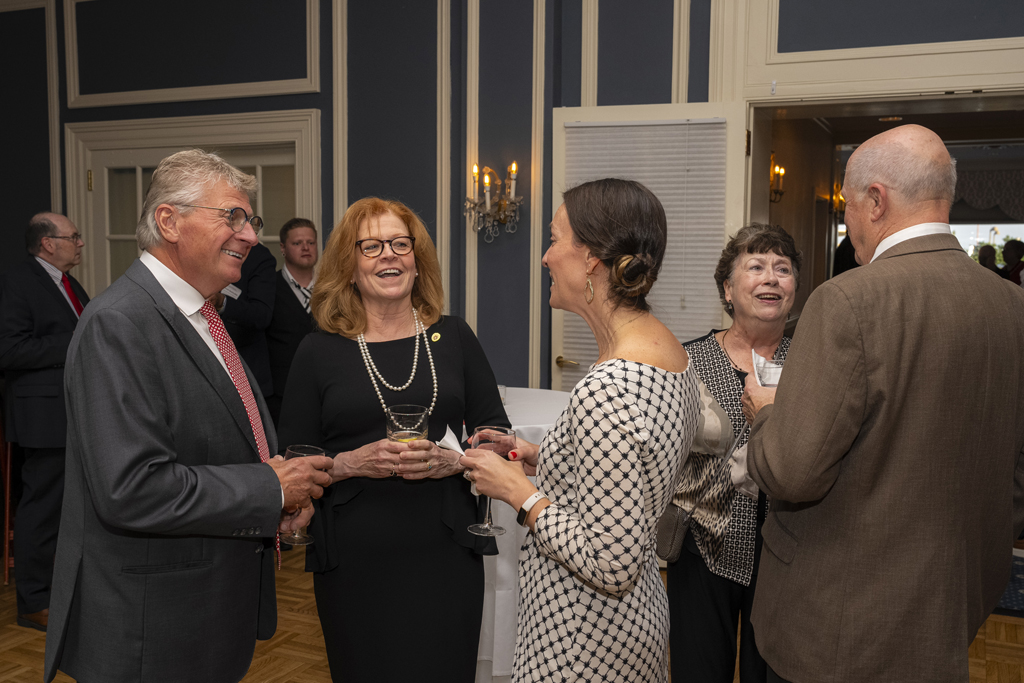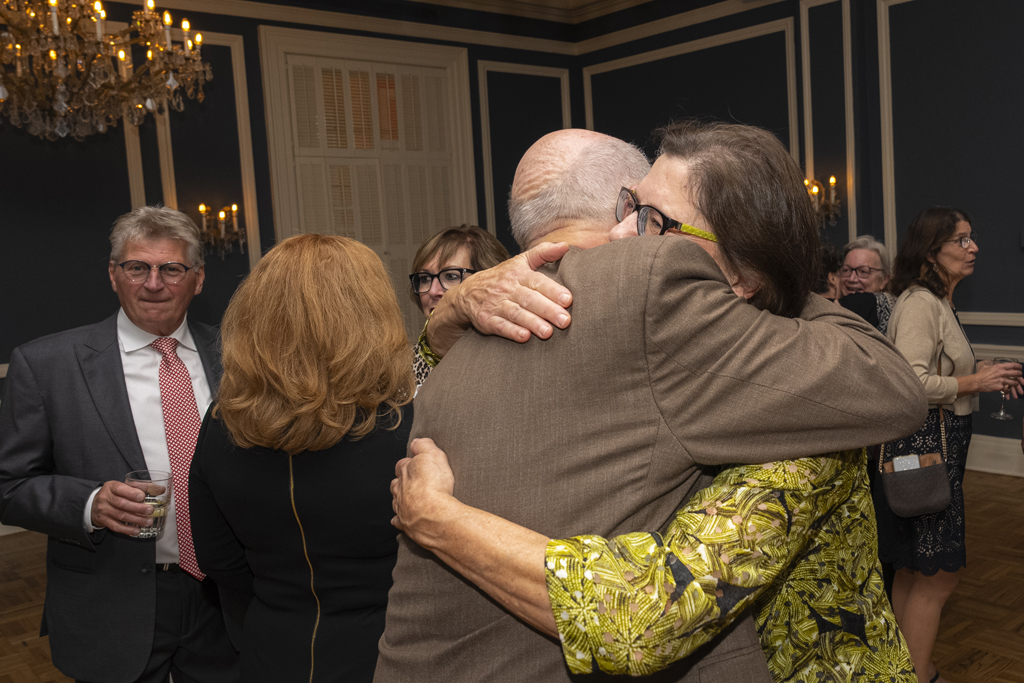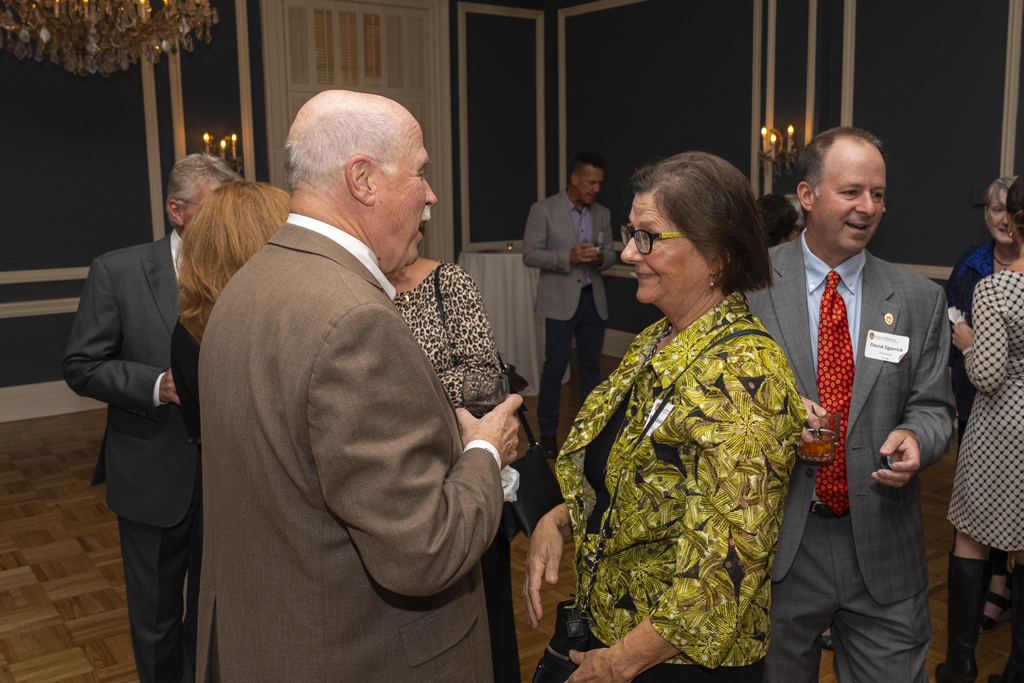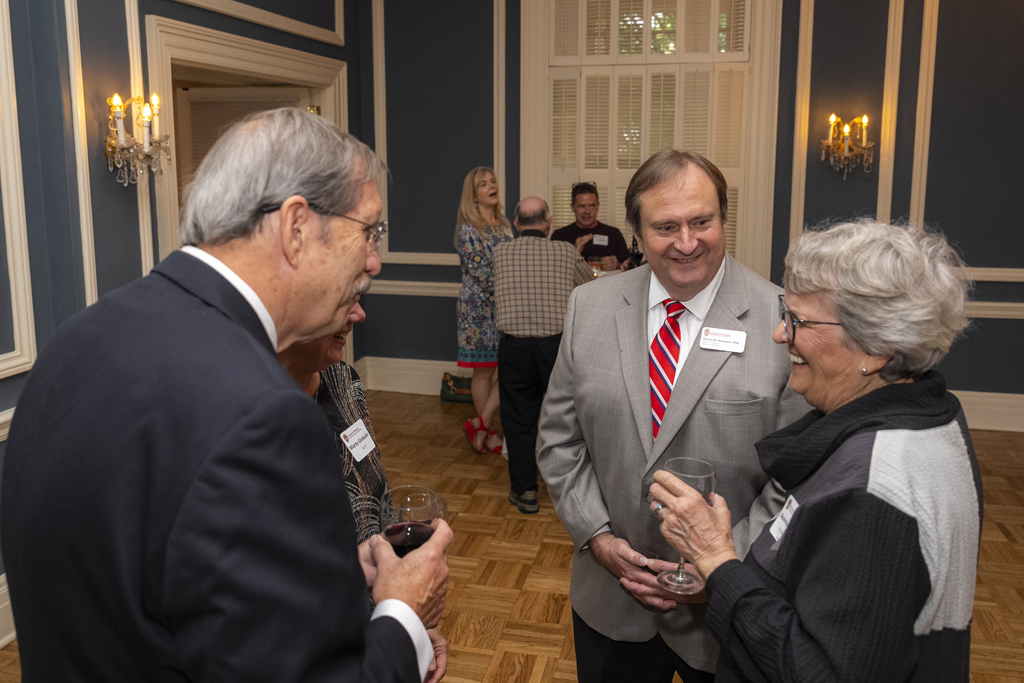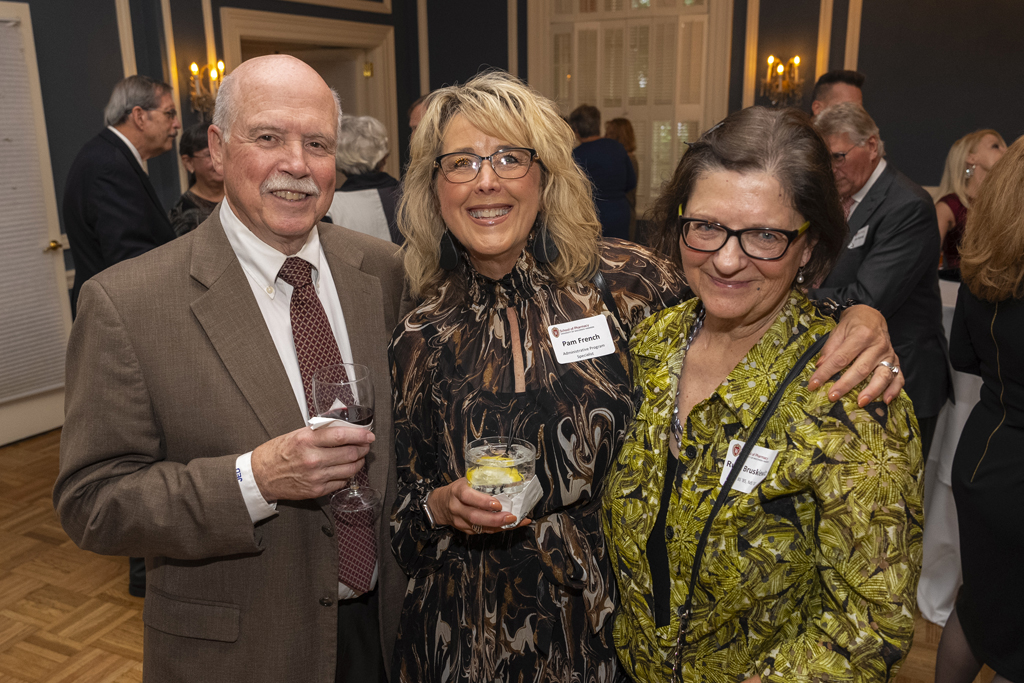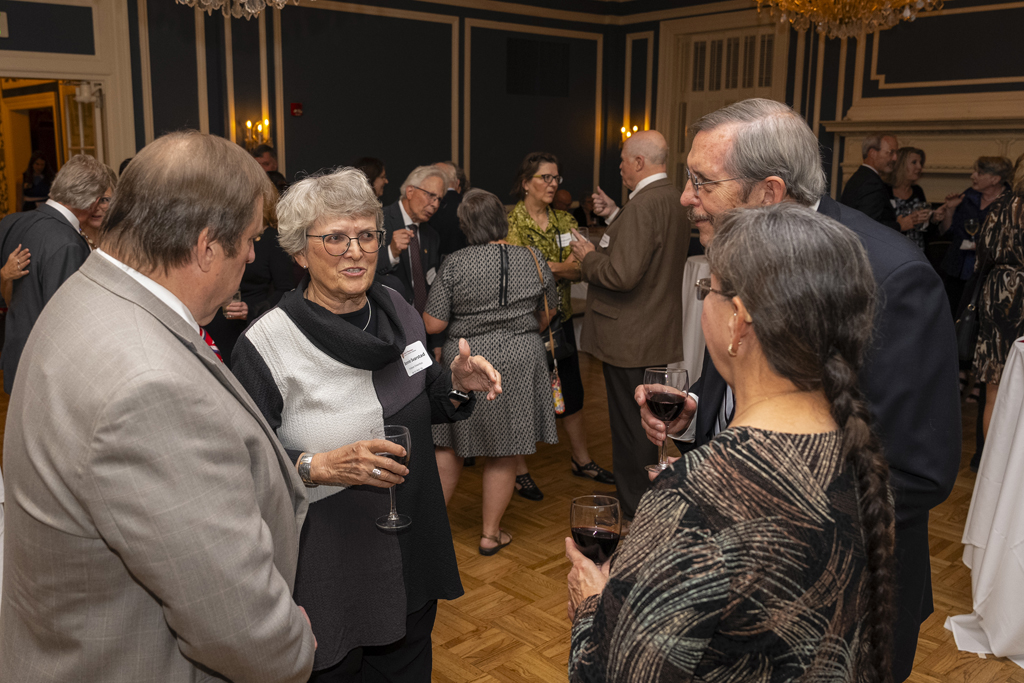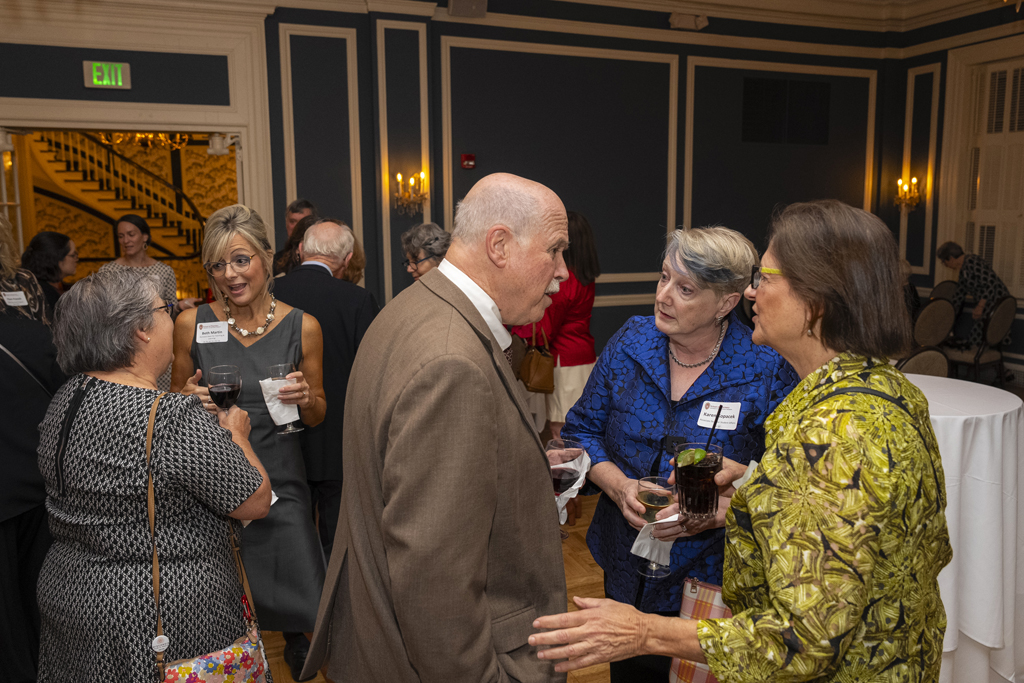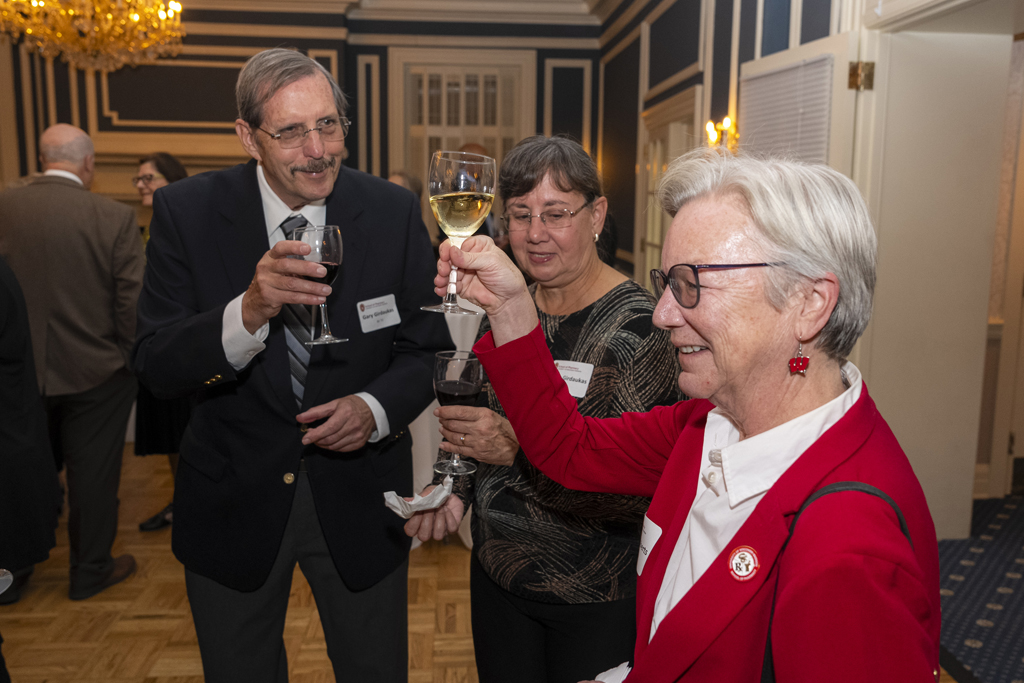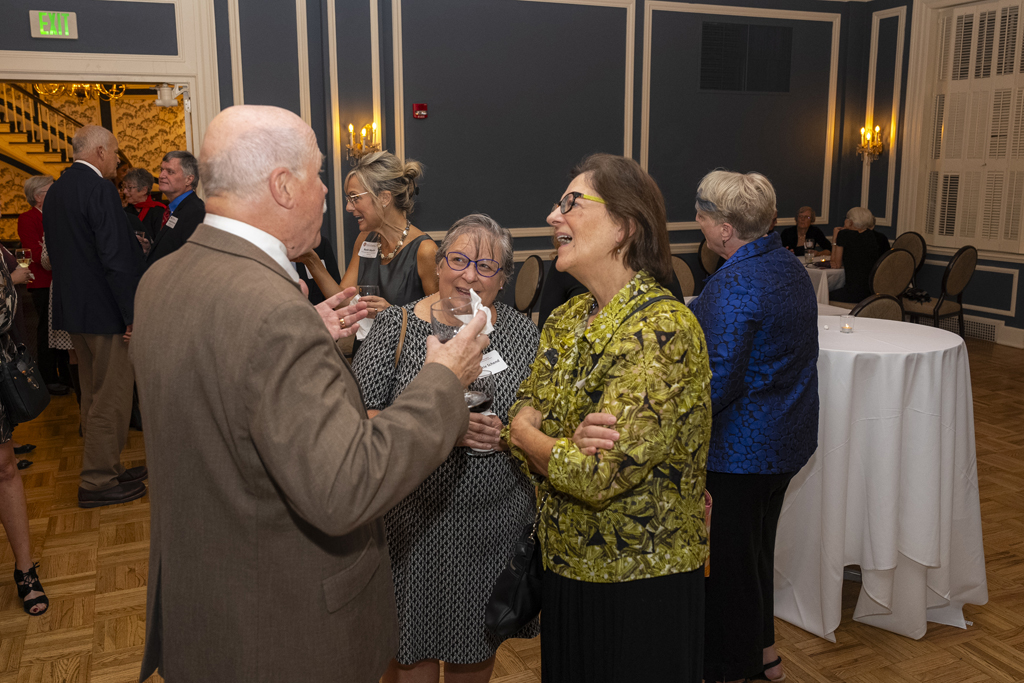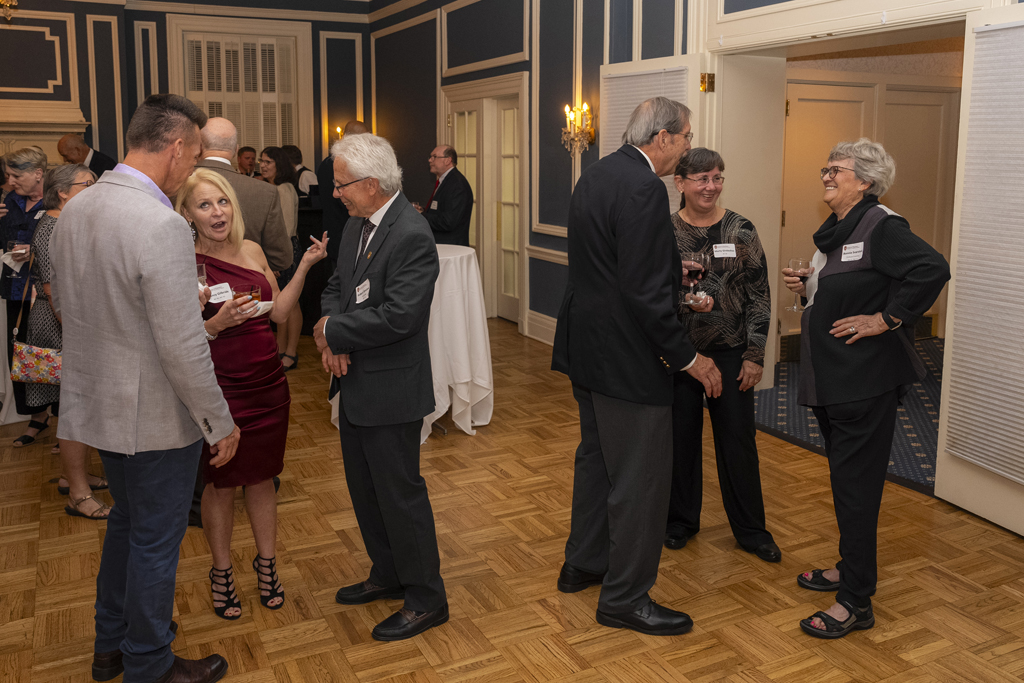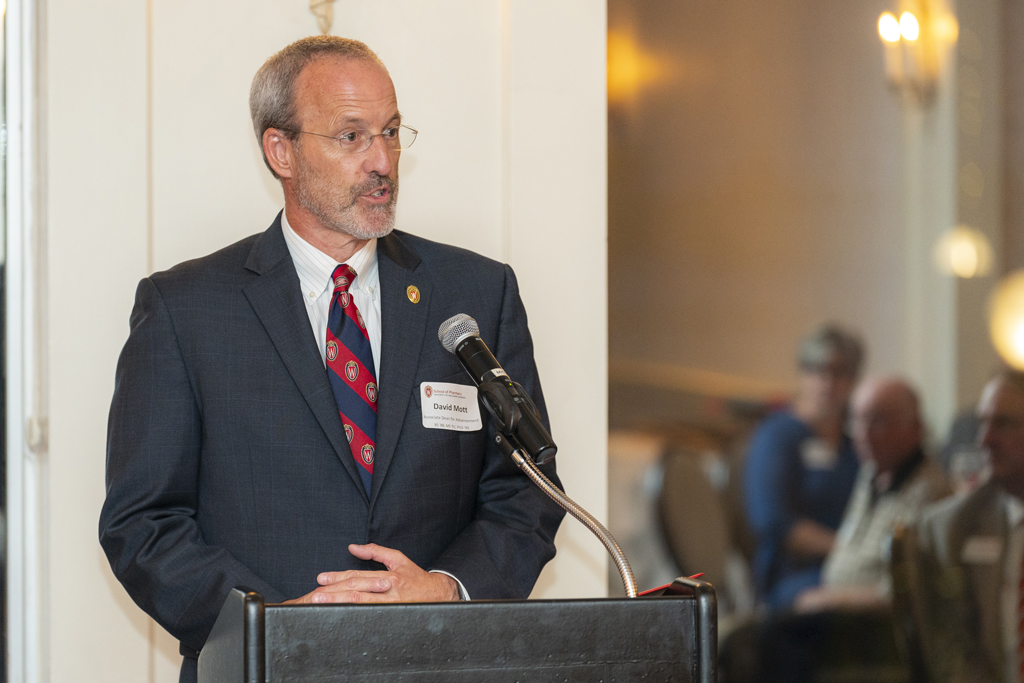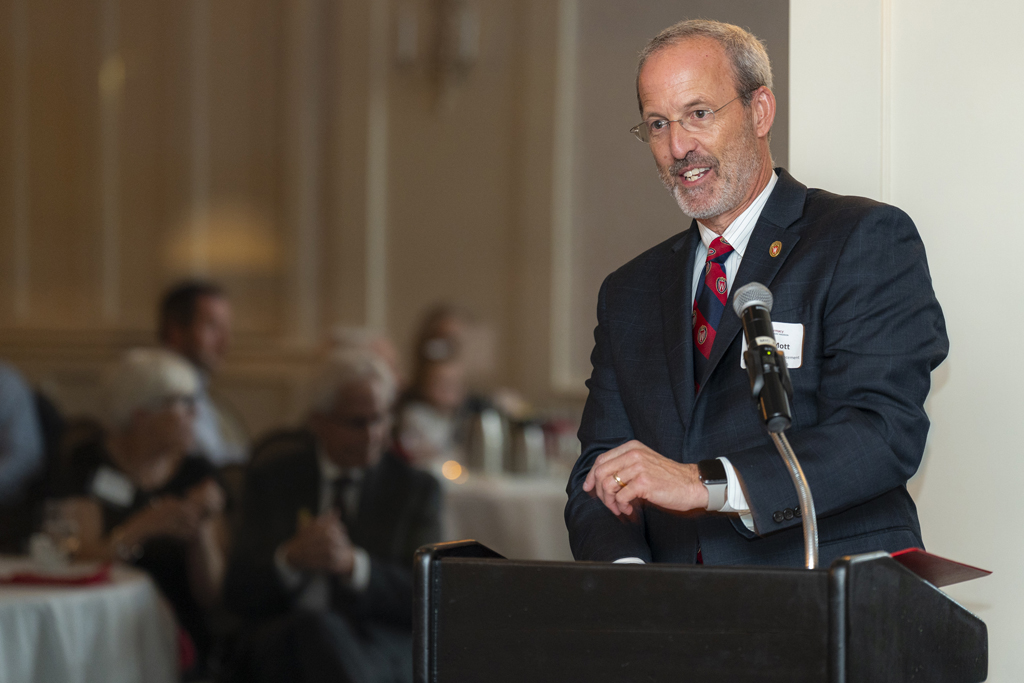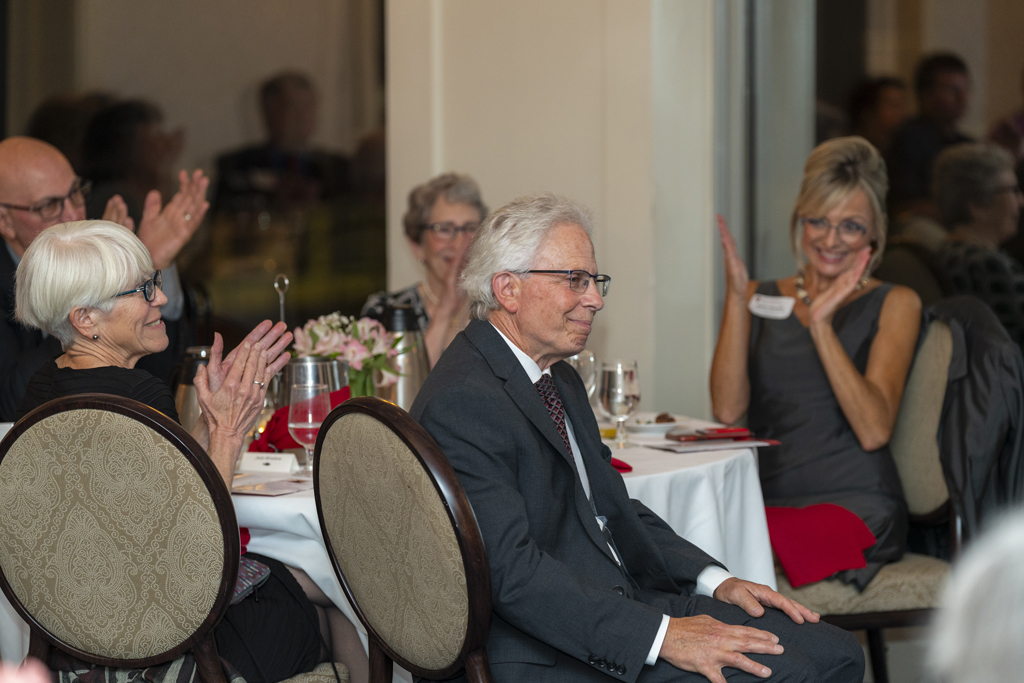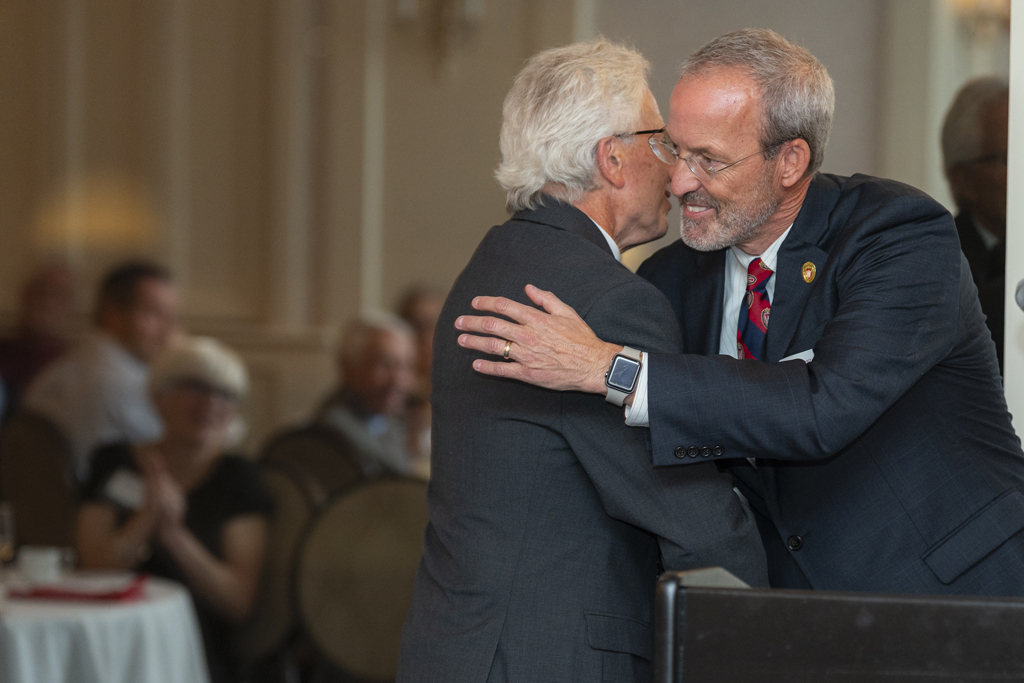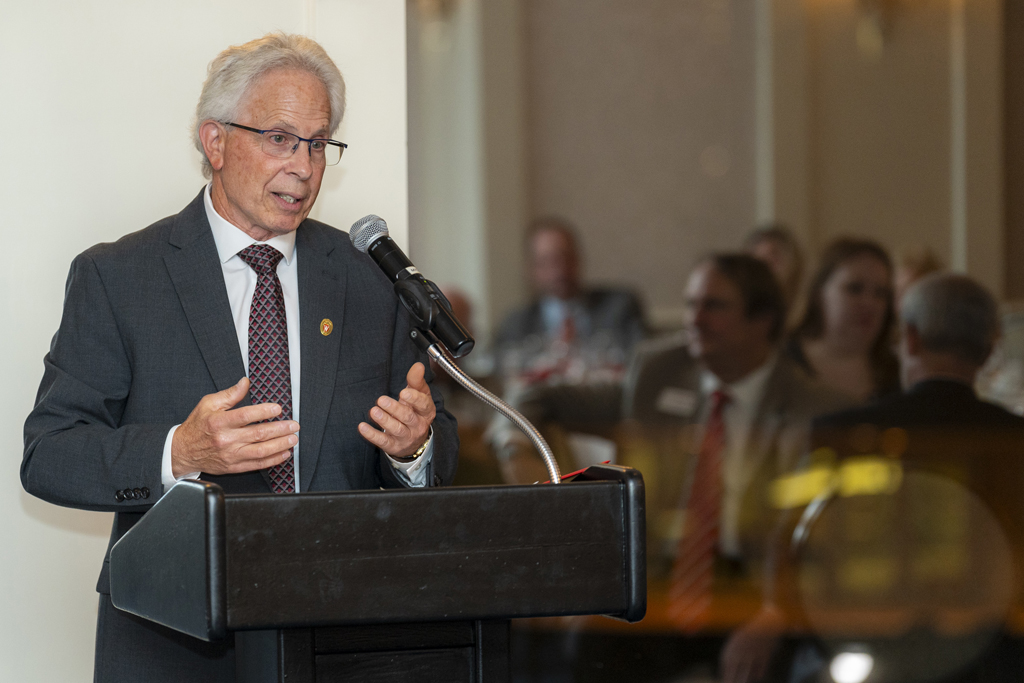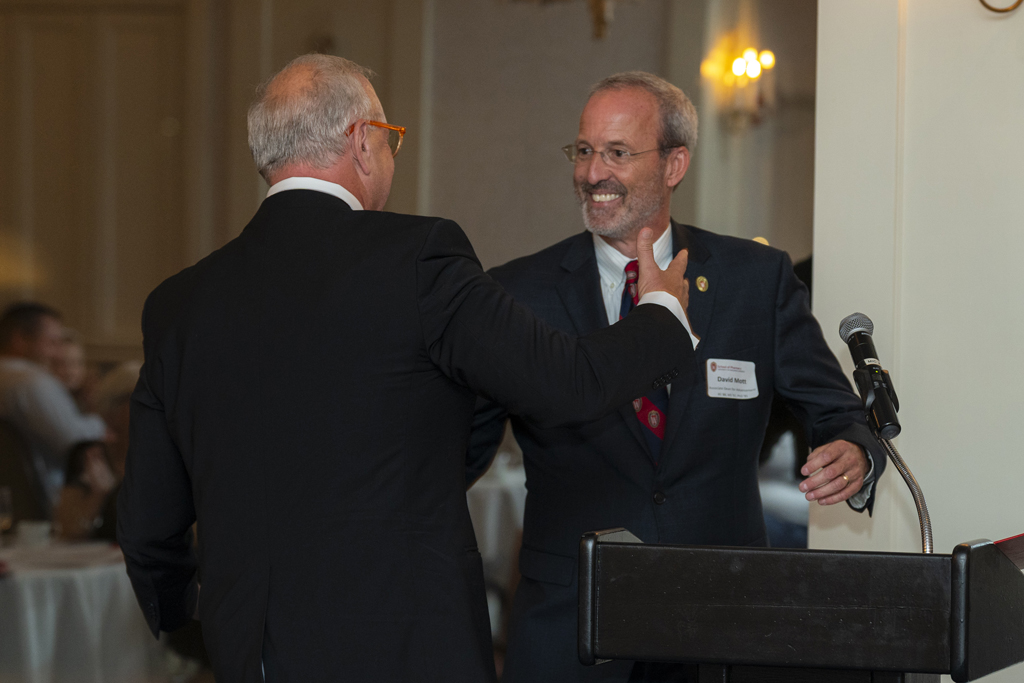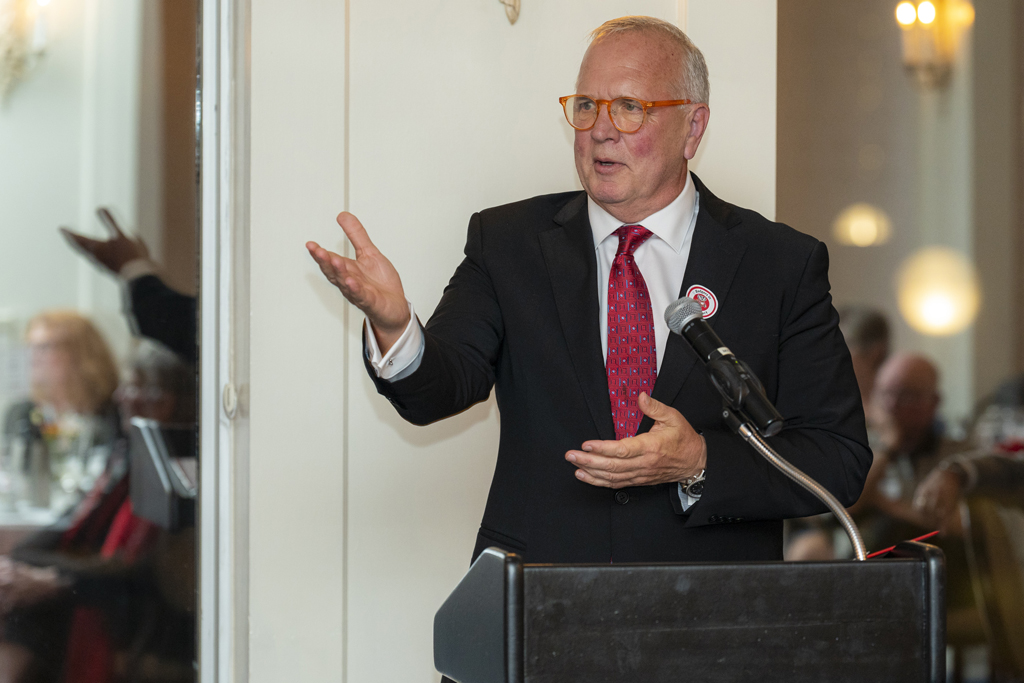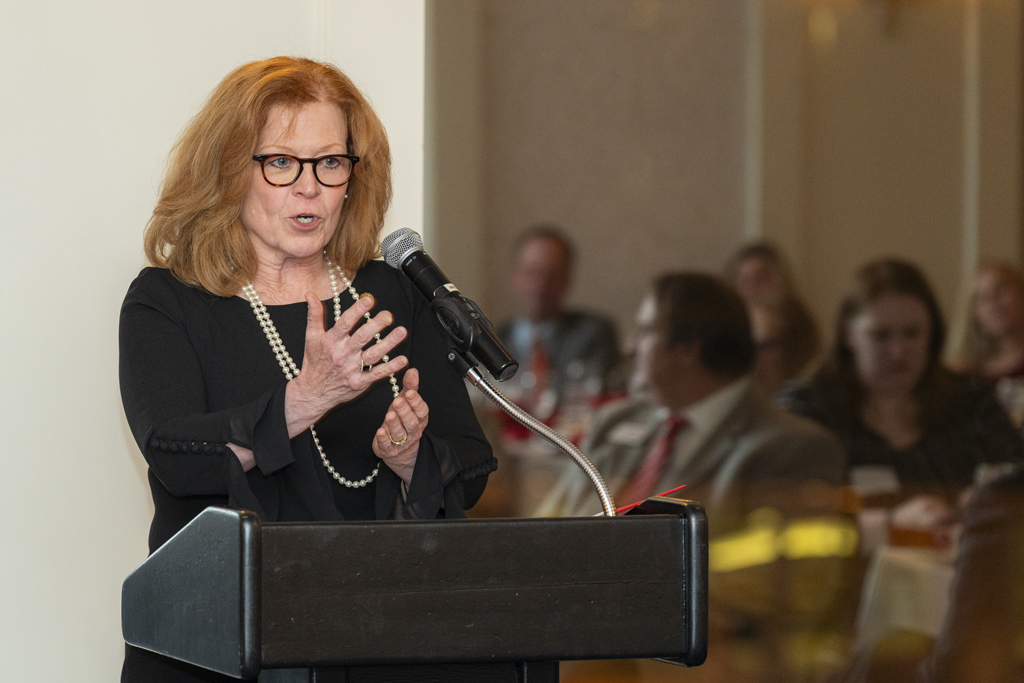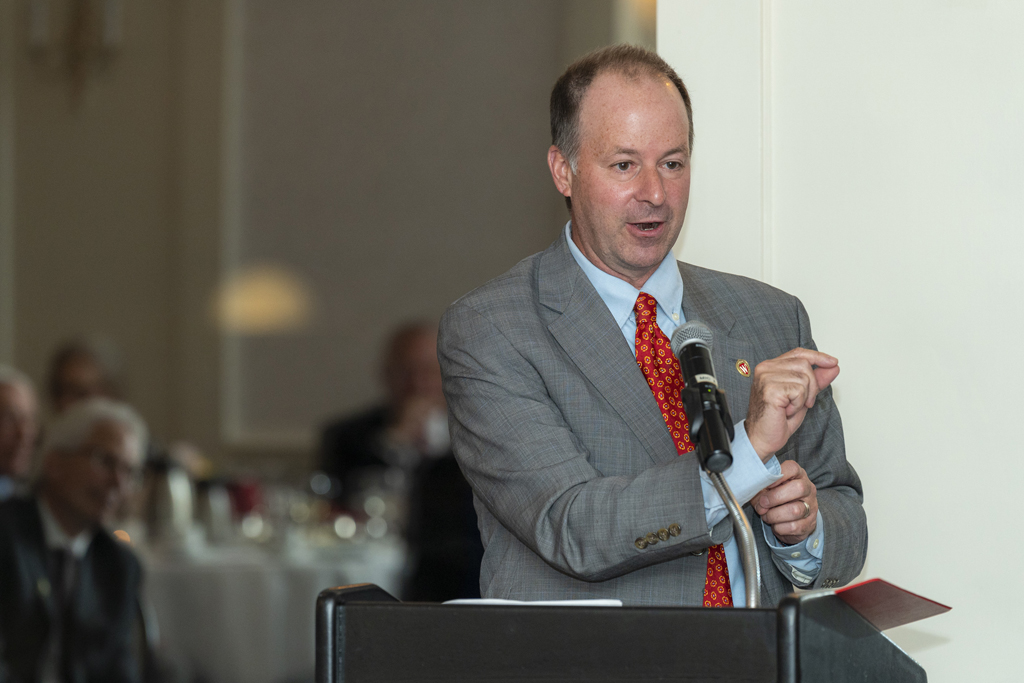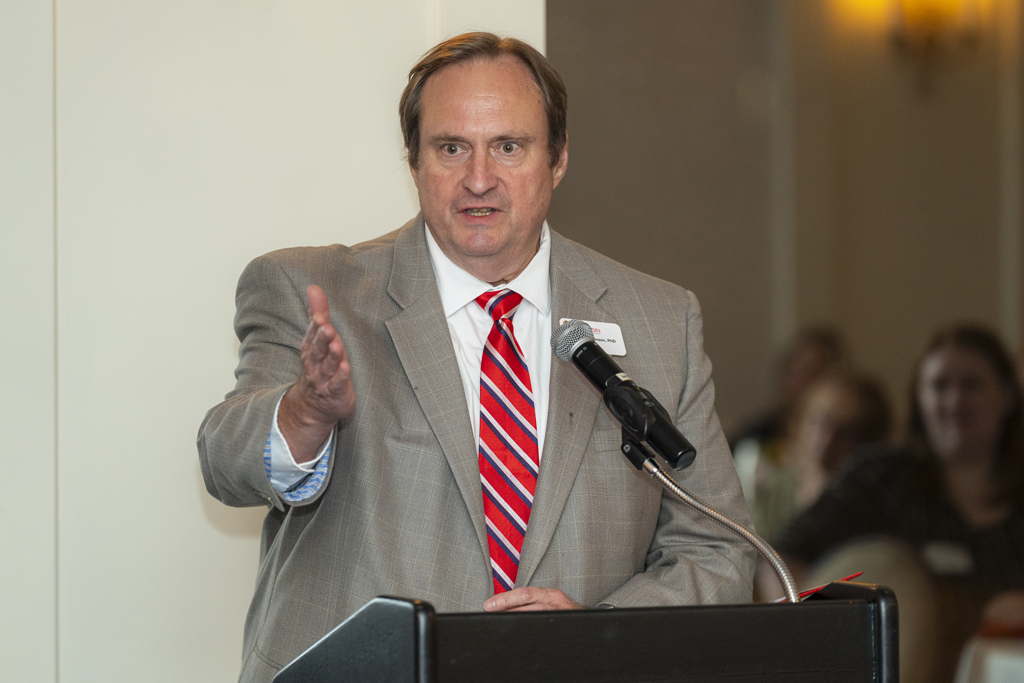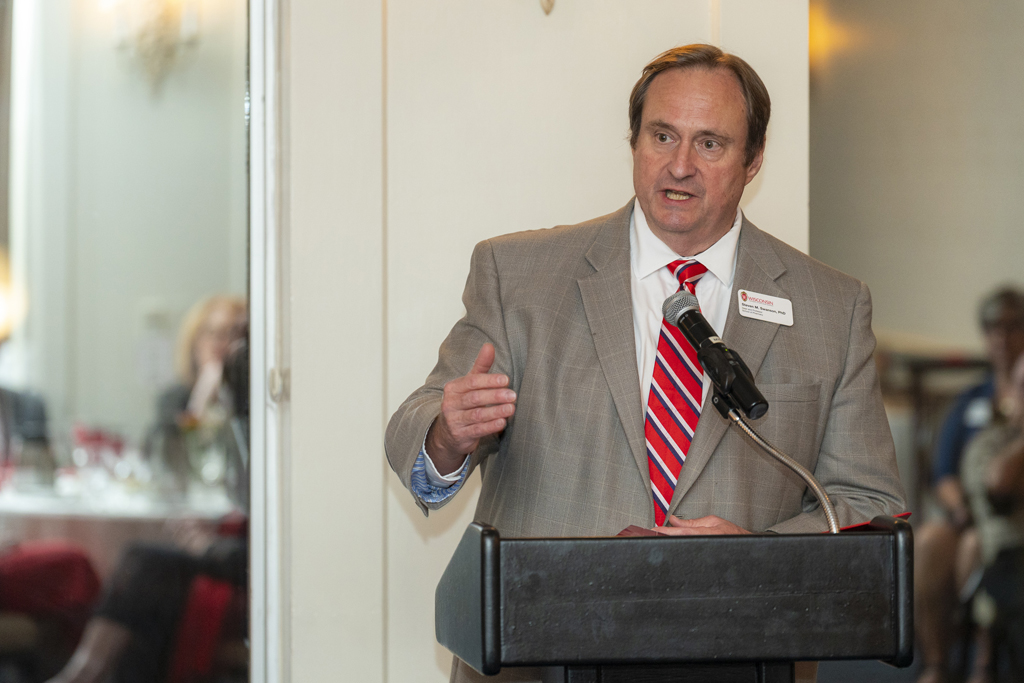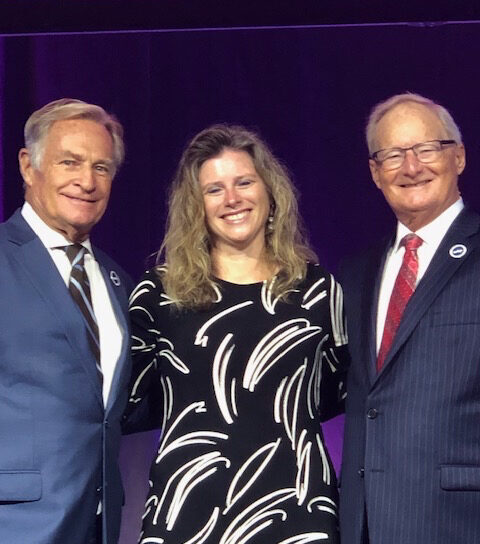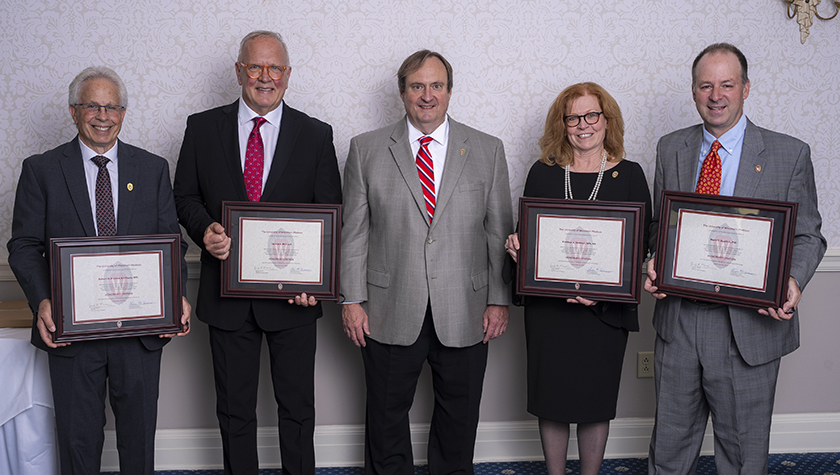
2023 Citations of Merit honor alumni contributions to academic research, education, and industry
By Katie Ginder-Vogel
The University of Wisconsin–Madison School of Pharmacy’s highest annual honor — the Citation of Merit — is now in its 70th year of commemorating the esteemed careers of alumni and friends of the School. The 2023 Citation of Merit award winners have contributed extensive research, academic leadership, teaching, and industry leadership to the field of pharmacy, improving patients’ lives through new therapeutics, pharmacy insights, and generations of mentored practitioners.
The four 2023 honorees are:
- Kathy Skibinski, manager of compliance and regulation, PharmEcology
- Bob Breslow, former associate professor, UW–Madison School of Pharmacy
- Dave Zgarrick, professor emeritus, Northeastern University
- Tom McCourt, CEO, Ironwood Pharmaceuticals
“Each year, we celebrate some of the most influential people in pharmacy education, research, and practice with Citations of Merit, and I’m continually reminded of the immense talent that has come through the School of Pharmacy,” says Steve Swanson, dean of the UW–Madison School of Pharmacy. “All four of this year’s distinguished honorees are not only alumni, but also ardent supporters of the School and our students. And most importantly, they’ve impacted the profession at every level.”
Photos by Andy Manis
Kathy Skibinski (BS ’86, MS '88)
Leading practice and education
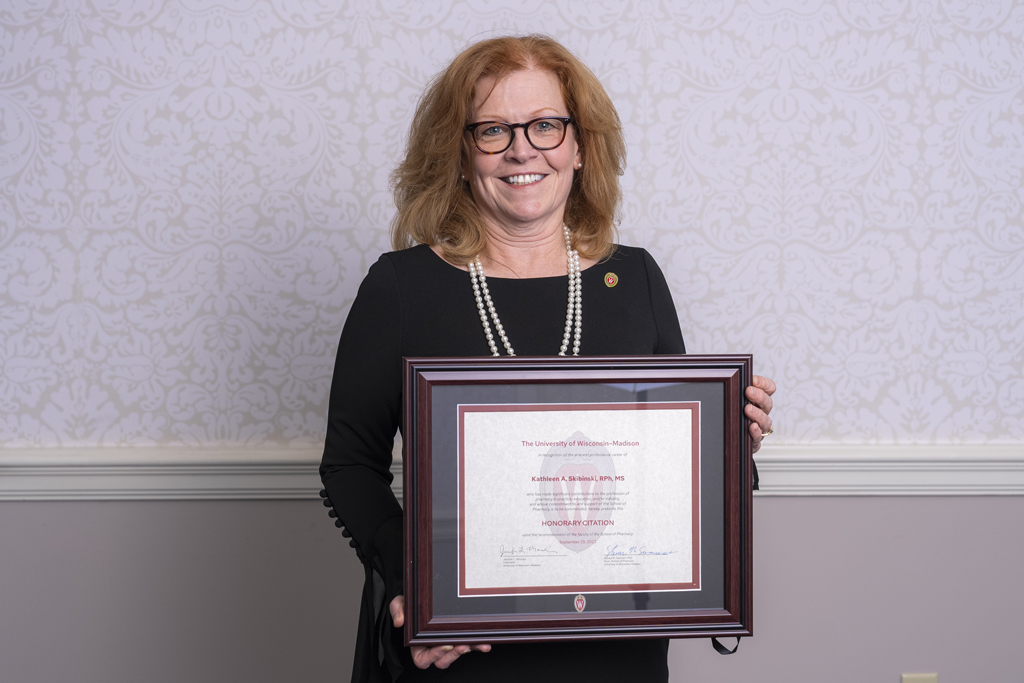
“I’m so grateful that I chose a career in pharmacy to challenge me and satisfy my need to help others,” says Kathy Skibinski. “My path was quite varied, and the projects I am most proud of in my career satisfy two criteria: It was the right thing to do for our patients, and it was accomplished by those committed to their patients and the profession of pharmacy.”
In some ways, Skibinski owes her career to her late brother, who set her on her path by encouraging her to select pharmacy as her major, due to her love of math and science, and helped her apply to the School of Pharmacy. She earned two degrees from the School before moving to Florida to take a role as a coordinator of ambulatory pharmacy services at Shands Hospital and clinical assistant professor at the University of Florida College of Pharmacy.
In 1990, she returned to Madison as assistant director of pharmacy services for acute care at UW Hospital and Clinics from 1990 until 1999, where she also served as a preceptor for pharmacy students and residents and clinical instructor for inpatient clerkships.
Three years later she joined the UW–Madison School of Pharmacy as a clinical instructor, where she taught until 2007, alongside fellow 2023 Citation of Merit awardee Bob Breslow (BS ’75).
“I worked mainly in continuing education, offering clinical courses applicable to pharmacists, nurses, and doctors,” Skibinski says. “I also developed and taught the medication safety course for pharmacy students, using a multi-disciplinary approach focused on reducing medical errors and improving patient safety through the design of a safer health system. The Schools of Pharmacy, Nursing, and Industrial Engineering came together as faculty and students to explore how to prevent harm to our patients in daily practice, which was exciting.”
In 2004, she became the associate dean for student affairs at the School of Pharmacy, overseeing the admissions process.
“I never thought I’d receive this award and it’s humbling to be a member of this group.”
—Kathy Skibinski
“The faculty took their admissions roles very seriously, and when the admitted students arrived, the faculty were very proud of the student pharmacists,” says Skibinski. “The students were already very accomplished, and our job was to help them succeed even further in their academics and experiential education.”
Skibinski later moved to St. Mary’s Hospital, as the clinical pharmacy supervisor and pharmacy residency program director from 2007 to 2012, working under fellow alum Russ Jensen (BS ’70, MS ’74), until she got the opportunity to impact practice across the state.
“When I left St. Mary’s, the Pharmacy Society of Wisconsin (PSW) needed a project director to manage their $4.1 million Health Care Innovation Award from the Centers for Medicare and Medicaid Services,” she says. She credits the work of the Wisconsin Pharmacy Quality Collaborative and its network of community pharmacies with helping PSW land the grant.
“They were providing comprehensive medication reviews, disease management services, and refocusing community pharmacy practice on their patients,” says Skibinski. “My role at PSW was to manage the grant to support and augment the work underway by that network of accredited pharmacies throughout Wisconsin that are committed to higher standards of medication management, patient education, quality assurance, and patient safety.”
Skibinski held that role for several years, before becoming a clinical pharmacist at the UW Health Rehabilitation Hospital in 2015.
After meeting fellow alumna Charlotte Smith (BS ’68), who helped with the School’s continuing education courses and served on the School’s Board of Visitors, Skibinski was inspired to join PharmEcology, a company Smith founded that focuses on protecting the environment and safety of healthcare workers from hazardous waste disposal and hazardous drug handling. Since 2017, Skibinski has been their manager of compliance and regulation.
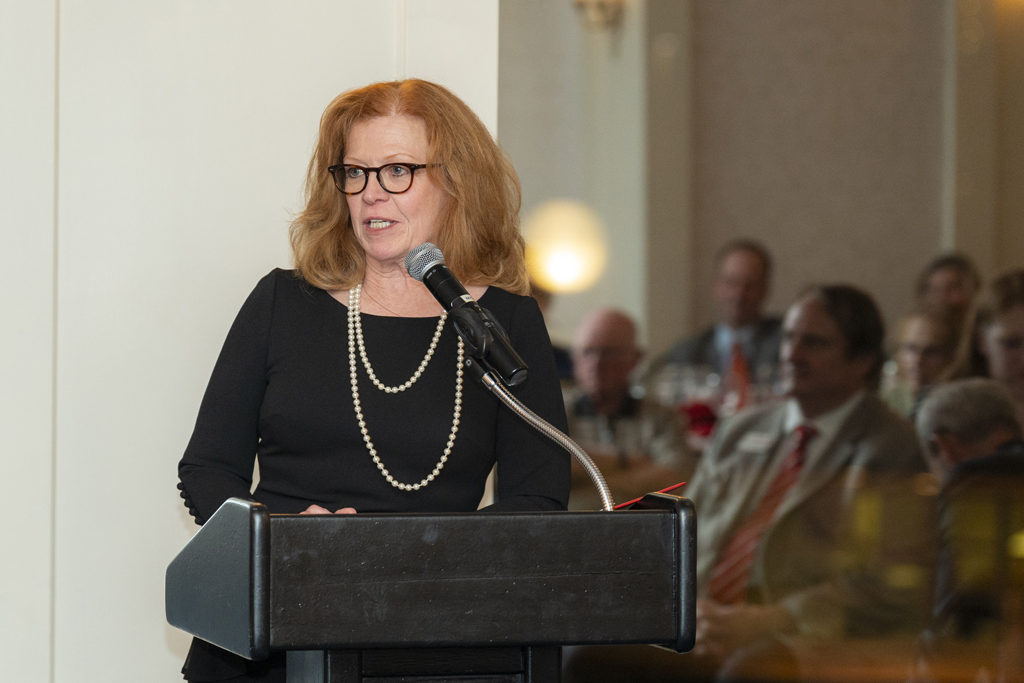
“Our work has taken the proprietary database originally designed for managing hazardous pharmaceutical waste (as defined by the EPA) generated in hospitals and transformed that database to meet the standards of safely handling hazardous drugs (as defined by NIOSH) to help meet new healthcare standards,” explains Skibinsi. “In addition to supporting healthcare, PharmEcology services support the work of vendors responsible for treating and disposing of the waste and incorporating sustainability efforts.”
Across her myriad pharmacy roles, Skibinski built relationships with strong leaders in Wisconsin pharmacy, who became her mentors: Smith; Jensen; Pam Ploetz (BS ’68), former associate director of pharmacy practice, education, and research at UW Health; Tom Thielke (BS '67, MS '69), former director of pharmacy at UW Health; David Zilz (BS '62, MS '64), former director of pharmacy services at UW Health; Chris Decker, former CEO of the Pharmacy Society of Wisconsin; and former School of Pharmacy Deans Mel Weinswig and Jeanette Roberts.
“You need mentors throughout your pharmacy education and career,” she says, “somebody to provide you with critical feedback to tell you, ‘You’re right in your approach,’ or ‘Let’s think about this a little differently.’”
With her Citation of Merit, she joins the rank of her mentors, who have each also earned the award.
“It kind of takes your breath away,” she says. “I never thought I’d receive this award and it’s humbling to be a member of this group.”
Although she no longer works with student pharmacists, she still encourages them to keep learning and remember to keep the patient at the center of it all.
“Even though healthcare continues to change as we advance care, patients still want the same thing from us — to heal them and their families,” she says. “Every day you go to work is an important day in the lives of your patients.”
Back to topBob Breslow (BS '75)
Geriatric pharmacist and educator
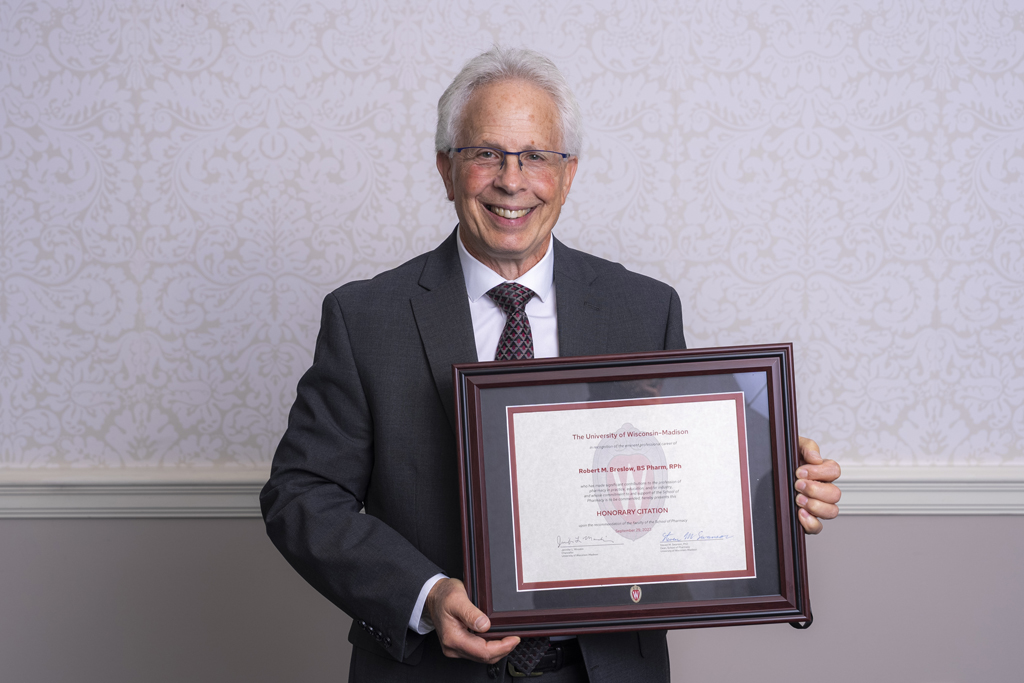
“I see my 44-year career as a pharmacist and academic as a stroke of good luck,” says Bob Breslow, who retired as an associate professor in the UW–Madison School of Pharmacy’s Pharmacy Practice and Translational Research Division in 2020.
“I made the decision to pursue a career in pharmacy by the flip of a coin. Not something I would generally recommend, but I venture to say it turned out okay,” says Breslow. “At the time, I had no idea I was attending a first-class school of pharmacy that continues to be first class. I’m proud to be an alum and a former faculty member.”
It may have helped that UW–Madison School of Pharmacy former Dean Mel Weinswig, whom Breslow has known for 50 years, encouraged Breslow to apply for admission to the School of Pharmacy when he was chair of the Division of Pharmacy Professional Development.
After graduation, Breslow took an internship in community practice in Eau Claire, Wis. When his sister saw a listing in the local newspaper for a clinical pharmacy position at St. Mary’s Hospital in Madison, Breslow applied and landed the job, marking the start of his 21-year career as a clinical pharmacist in hospital practice.
“I cared for older adults, a group of patients whose needs are underappreciated,” he says. “The appreciative feedback I got from patients and their families that a pharmacist would take the time to talk about their meds was meaningful.”
Breslow stayed at St. Mary’s Hospital for five years, before moving to UW Hospital for the next 16. Breslow was invited to guest lecture at the School of Pharmacy in the early 1990s and found he enjoyed it. As a clinical pharmacist at UW Hospital, he also contributed to the School’s academic program as a clinical instructor.
“It was right up my alley to do more teaching and contribute to the care of older adults in an academic setting,” he says.
“In my heart and at my core, my overall career goal has been to care for patients to the best of my ability and to educate students so that they could provide high-quality care.”
—Bob Breslow
Good fortune brought Breslow to the School of Pharmacy in 1997 to coordinate the non-traditional Doctor of Pharmacy Program, which delivered coursework to pharmacists who had a Bachelor of Pharmacy degree and wanted to earn the PharmD degree, equivalent to that of the Doctor of Pharmacy program. With the sunsetting of the non-traditional program, Breslow became a full-time academic.
Weinswig, then dean of the School of Pharmacy, supported Breslow’s hire for the position.
“It goes without saying that Mel played a pivotal role in my career,” Breslow says. “About half my career was in clinical practice, and I’d have to say, at the core, my focus was patient care, then educating students. I hope that is my legacy.”
Breslow believes you get out of your career what you put into it and is a supporter of taking risks and opportunities to pursue new things — regardless of whether it works out.
“If it’s successful and gives you meaning in your career, it was worth the risk,” he says. “Being a lifelong learner, putting in the effort, taking your mentors’ advice when they try to set you on a better course in your career — all of that will put you in good stead over your career.”
When he reflects on his career, Breslow says the times he embraced opportunities that fell in his lap always provided his career with positive returns.
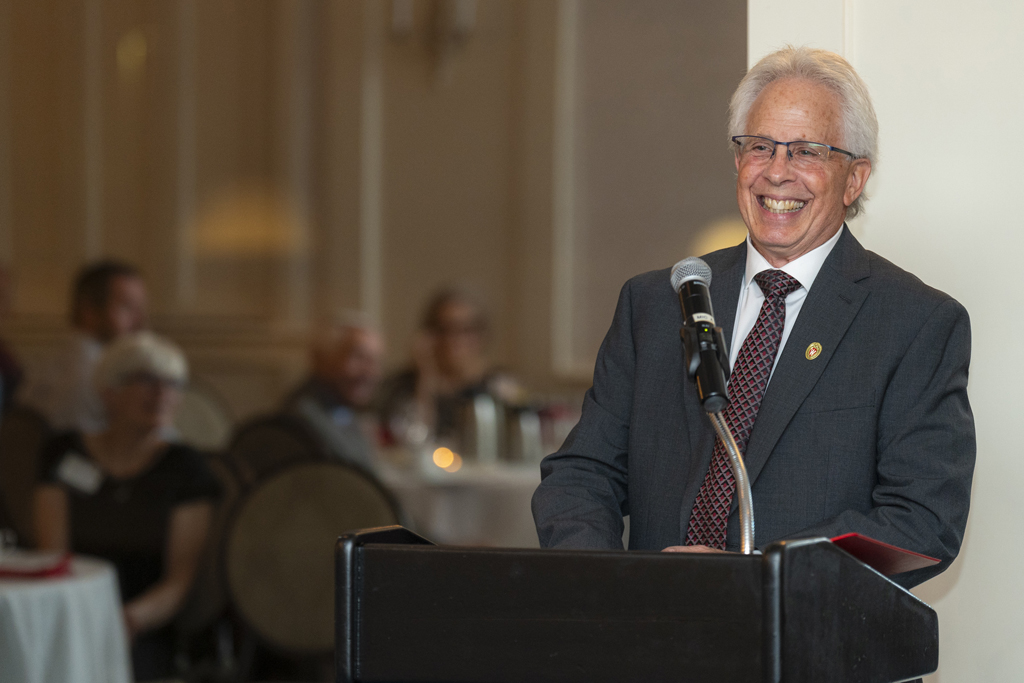
“While we set goals for ourselves early on, you have to be open to new opportunities that may at first glance seem to be outside your comfort zone but can very much be worthwhile and make a huge difference in other people’s lives and in your own career,” he says. “Risk is often more worth it than the downside of failure. I’ve had failures; I’ve had downturns and disappointments in teaching, but I persevered.”
For example, Breslow cites opportunities in leadership in professional organizations, in practice, and in academia, where he chose to step forward.
“I am extremely fortunate to have been invited to contribute to several teams, academic courses, projects, and School of Pharmacy committees that had an intellectual and practical purpose to provide a higher quality of pharmacy education and better patient care, especially for older adults,” he says.
Since retirement, Breslow and his wife, Jean, have been traveling. Most recently, they traveled to Iceland, and in their goal of camping and riding around the U.S. with their horses, their next adventure is set for Southern Illinois. But his dedication to patients continues.
“A couple years ago, I began volunteering at a free clinic in Dodgeville, Wis., providing pharmacy services,” Breslow says. “That’s been an eye-opening experience.”
Reflecting on his career, it was his focus on patients that motivated his every step.
“In my heart and at my core, my overall career goal has been to care for patients to the best of my ability and to educate students so that they could provide high-quality care,” Breslow says.
Even with that commendable mission readily accomplished, Breslow was pleasantly surprised by his Citation of Merit.
“It’s an honor to be recognized,” says Breslow, “I was absolutely awestruck by other honorees over the years. I am honored to now be among them.”
Back to topDave Zgarrick (BS '88)
Illuminating the profession through research
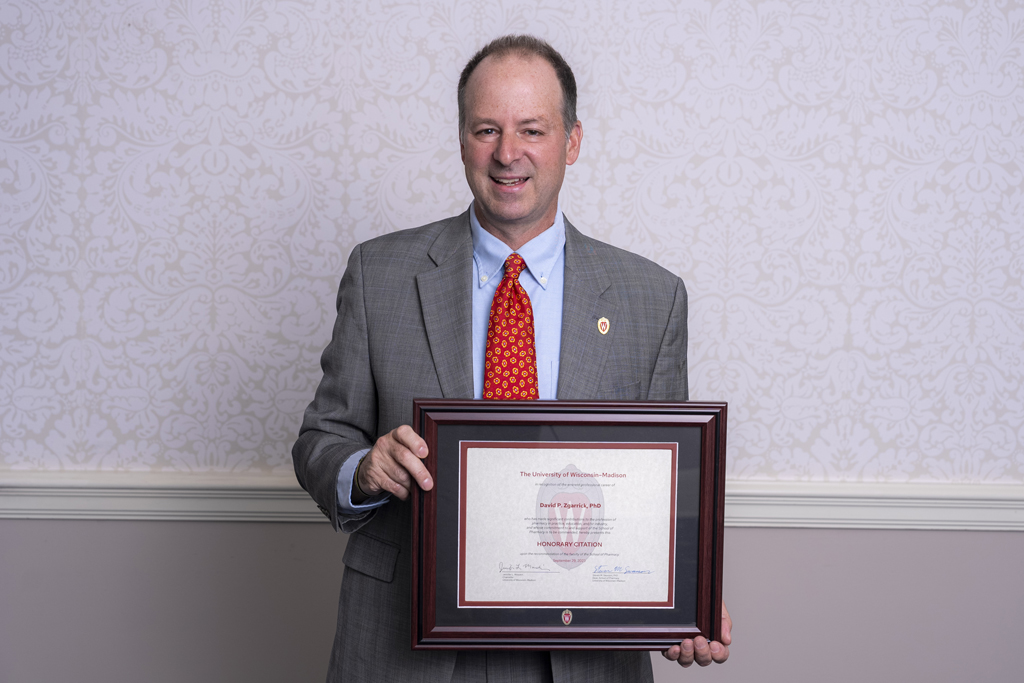
As a high school student in Marshfield, Wis. — home to the headquarters of Marshfield Clinic, which has 60 locations around the state — Dave Zgarrick had many friends whose parents worked in healthcare and assumed he would take the same route. When he visited UW–Madison his junior year, he planned to major in chemistry prior to applying to medical school. That’s when he met his first mentor at the School of Pharmacy: pre-pharmacy advisor Pat Resch, who explained what a career in pharmacy might be like.
“Once I got into pharmacy school, my eyes really opened up to everything you can do with a pharmacy degree,” Zgarrick says. “Most people think only of retail pharmacists, and I worked in a community pharmacy for a few years, which was a wonderful experience.”
Zgarrick also became aware of the broader career opportunities in the field of pharmacy, like academic research on the way drugs are developed and used.
“What gets you on a path to research is having a lot of questions and learning how to find answers to your questions, especially when you can’t find those answers by looking them up in reference books,” says Zgarrick.
He spent a summer doing research in a medical lab at the Marshfield Clinic Medical Research Foundation that targeted the problem of wild horse overpopulation by developing a birth control implant for horses.
“That led to the development of the drug now known as Norplant,” he says. “The cool thing about research is it connects itself to things that really matter and have an impact.”
Zgarrick didn’t think bench research was his thing, but he was still asking questions about why pharmacists choose the careers they do — in community pharmacy vs. hospital or industry, for example.
“I’m happy and honored that not only was I able to lead and serve, but I also helped a lot of other people learn, grow, and develop their careers.”
—Dave Zgarrick
“I had questions about the pharmacy workforce itself, and I was fortunate that the School of Pharmacy had a group of faculty in Social and Administrative Sciences who studied exactly that — Bob Hammel (BS ’48, PhD ’59), Bonnie Svarstad, Jeanne Mount, Dave Kreling, and Joe Wiederholt,” Zgarrick says.
Zgarrick credits Wiederholt for impacting his career, as well as that of countless students.
“He inspired me to go onto graduate school, and ultimately, when I became a faculty member specializing in pharmacy management, validated how important that topic is and that pharmacists need these management skills, in addition to knowledge about how medications work, to truly be effective,” says Zgarrick. “I hope I helped pharmacists realize they are more than their knowledge of drugs.”
To recognize Wiederholt’s legacy after his passing, Zgarrick helped create book, Pharmacy Management: Essentials for All Practice Settings, in the early 2000s, which is now in its fifth edition.
“It’s a way to honor Joe and what he gave to so many people, including me,” Zgarrick says. “When I think about my own legacy, first I look at that book and my contributions to pharmacy management and pharmacy management education and research.”
Zgarrick earned his PhD at The Ohio State University, then joined the faculty at Midwestern University in Chicago, which was starting its pharmacy program.
“That role developed me as an academic administrator and leader,” he says. “Teaching and developing faculty as educators picked up on my passion for pharmacy management.”
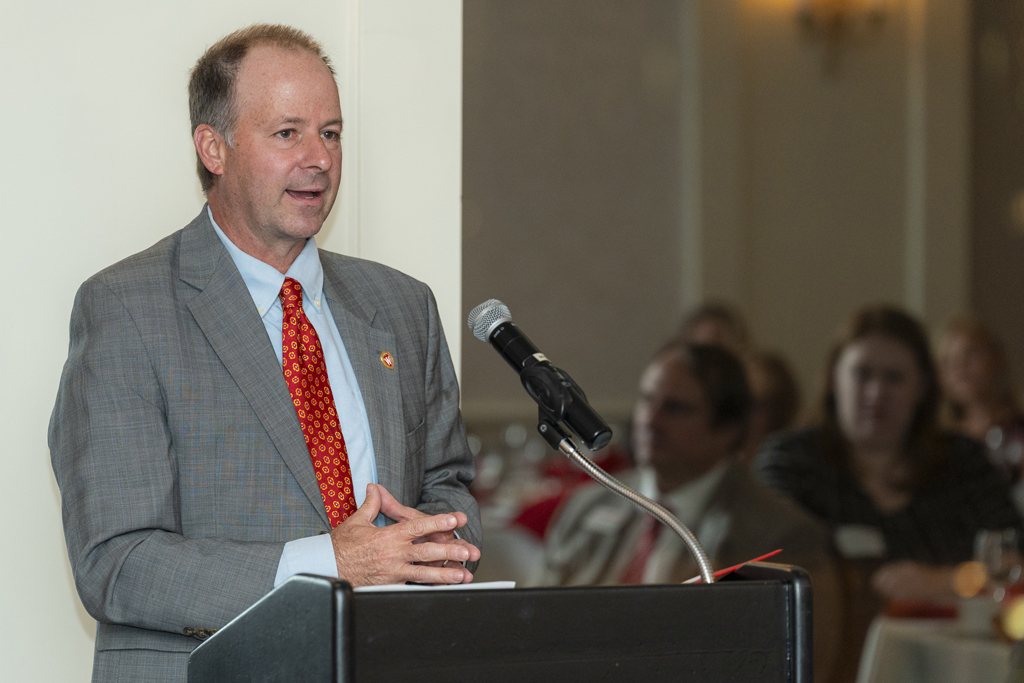
Building on his student leadership, Zgarrick remained active in the American Association of Colleges of Pharmacy (AACP), leading subsections, serving as a Council of Sections leader and head of Council of Faculties, and serving as AACP’s Treasurer for six, with a total of 12 years on the AACP board. That gave him a seat at the table to discuss health policy matters that impacted higher education and health care and the ability to bring other promising leaders into new roles.
“I’m happy and honored that not only was I able to lead and serve, but I also helped a lot of other people learn, grow, and develop their careers,” he says. “I’m also proud of my leadership within the institutions where I worked. I value seeing what the people I could help support have been able to do with their education, training, and careers — it’s very gratifying.”
Zgarrick was on the faculty at Midwestern University–Chicago College of Pharmacy, chair of the Pharmacy Practice departments at Drake University and Northeastern University, acting dean of Northeastern’s School of Pharmacy, and associate dean of faculty for Northeastern’s Bouvé College of Health Sciences.
He served on the School of Pharmacy’s Board of Visitors and gave the commencement address at the School of Pharmacy’s hooding ceremony in 2018. He retired from Northeastern in August 2022 and is now a professor emeritus, contributing teaching and consulting work to the profession.
“I am very grateful to those who were a big part of my education at UW and started me down my career path,” Zgarrick says. “To be honored with a Citation of Merit along with this group of national and international pharmacy leaders is very humbling. You never think something like that will happen, and it feels wonderful.”
Back to topTom McCourt (BS ‘80)
Improving GI disease therapies
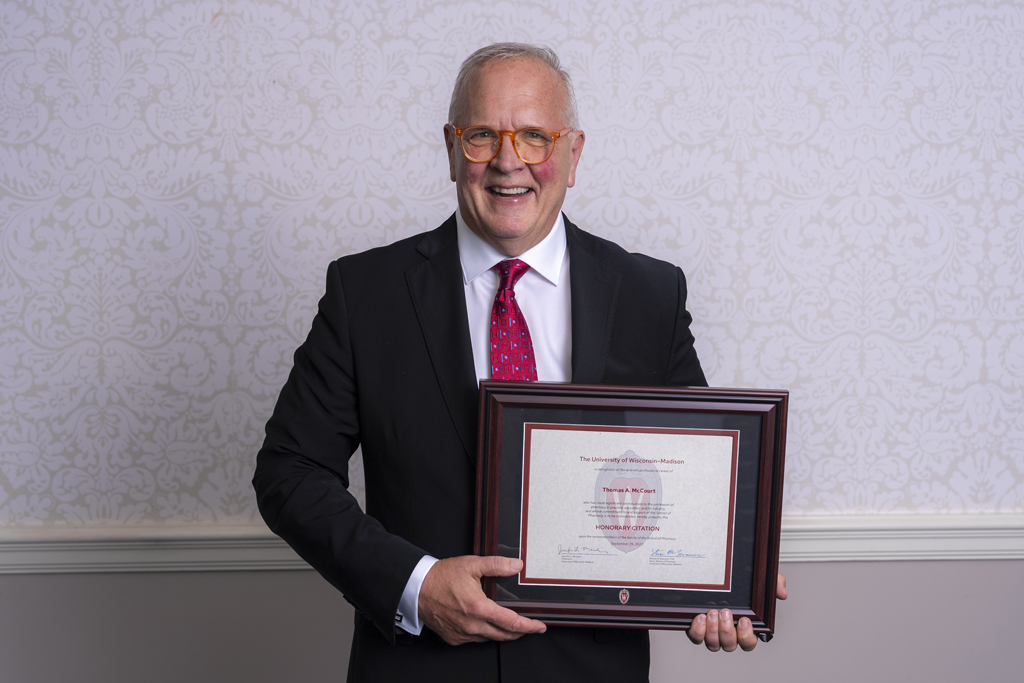
Growing up in the small town of Burlington, Wis., School of Pharmacy Board of Visitors member Tom McCourt watched his father Arthur McCourt (BS ’53) achieve success as a retail pharmacist.
“He was president of the state pharmacy association and was very proud of the School,” says McCourt. “He was an associate professor in the dispensing lab at the School of Pharmacy, and he donated a show globe that hangs in the Board of Visitors room.”
Arthur McCourt also received a Citation of Merit, in 1982.
“It meant a lot to him,” says McCourt. “I remember when he got the Citation, he talked about the values he aspired to have — service above self. He was always there to contribute and help, and he instilled many of those values in me. So, I feel very much the same way.”
Following the same mission as his father, giving back to the profession, has led him to accept the same award, 41 years later.
“I never imagined in my wildest dreams that I would get this kind of acknowledgement from such a wonderful and strong academic institution,” says McCourt. “To be recognized by your peers, distinguished faculty and professionals, particularly from an institution with the stature of UW, is pretty remarkable. I’m very proud.”
McCourt currently lives in Boston, after moving around during his career in the pharmaceutical industry.
“We’ve worked in Philly, New Jersey, North Carolina, Chicago, Minneapolis, LA, Switzerland, Sweden, and now Boston,” says McCourt. “Boston is now become the global hub of biotechnology, and to be there while that happened was cool to see.”
McCourt started his career at Merck and Astra Merck, where he launched Prilosec® and Nexium® and collaborated with the Food and Drug Administration (FDA) to resolve safety concerns about Prilosec.
“To be recognized by your peers, distinguished faculty and profession, particularly from an institution with the stature of UW, is pretty remarkable. I’m very proud.”
—Tom McCourt
“Developing and marketing Prilosec taught me the importance of following the data and evidence to inform the truth and make decisions that are right,” says McCourt. “It was an opportunity to convince the FDA that the drug was safe and expand its clinical utility. At one point, it was the number one drug in the world.”
McCourt was on the founding team of Astra Merck, which became AstraZeneca, before moving to Novartis to head up their gastrointestinal (GI) therapeutic franchise and launch its first drug, Zelnorm. When the FDA initially denied approval of Zelnorm, over questions about the seriousness of the disease, McCourt leveraged data and expert opinions to convince the FDA that irritable bowel syndrome was a real and legitimate medical condition that could safely be treated by Zelnorm and secure the drug’s approval.
“That was one of those career-defining moments, when you do something because it’s the right thing to do,” says McCourt. “My second career milestone is my collaboration with the American Society of Gastrointestinal Endoscopy (ASGE) on the Clinical Outcomes Research Initiative (CORI) database.”
ASGE launched CORI in 1995 to capture electronic endoscopy data from diverse clinical practice settings and use the findings to answer numerous clinical questions that impacted patient outcomes research. The National Institutes of Health recognized its potential and funded it for almost 15 years, it’s involved more than 200 GI centers, and it’s and generated more than 100 publications.
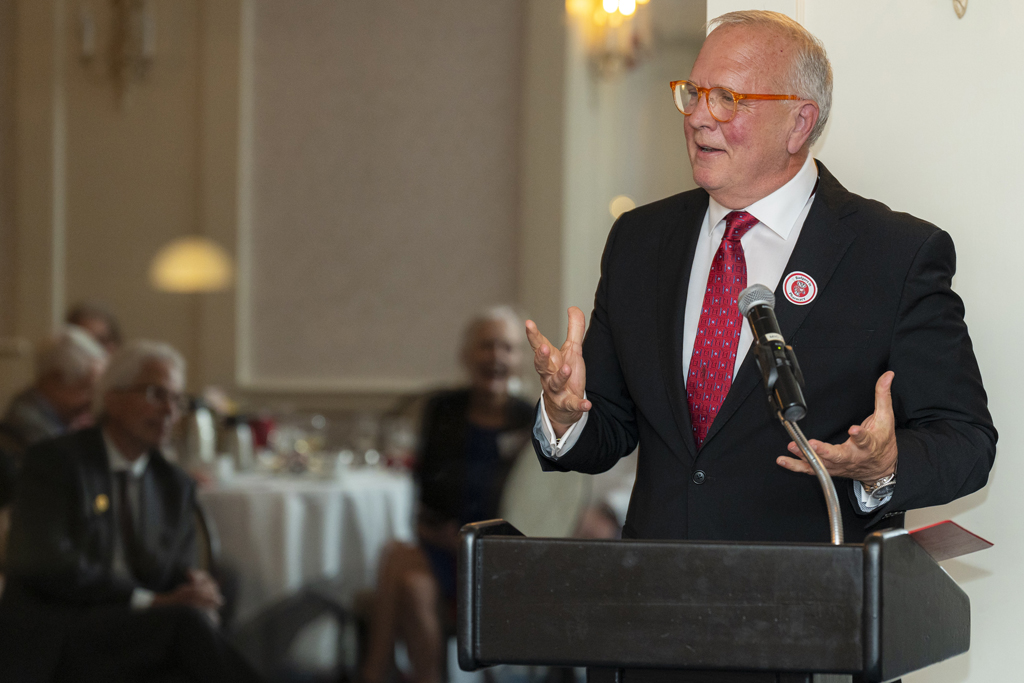
Now CEO of Ironwood Pharmaceuticals, McCourt took over the company five years ago and turned it around from losing $200 million a year to bringing in $250 million last year. The company’s drug Linzess, which treats irritable bowel syndrome with constipation (IBS-C), is now a market leader. Ironwood expanded its pipeline adding apraglutide, a GLP-2 agonist currently in phase 3 for the treatment of short bowel syndrome with intestinal failure and CNP-104 in phase 2, a potentially a disease-modifying treatment for primary biliary cholangitis (PBC).
“PBC is a rare liver disease, and many patients end up needing a liver transplant,” McCourt says. “We might be able to prevent that. We’re in a very exciting time.”
McCourt was on the board of Acceleron, which Merck acquired in 2021 for $11.5 billion, and he is now on the Board of Directors for Pliant Therapeutics, a clinical stage biotechnology company focused on discovering therapeutics for fibrosis.
For his multifaceted contributions to GI therapies, McCourt was honored with the American Society of Gastrointestinal Endoscopy (ASGE) 2022 President’s Award, and in May 2023, he received the Uber ELITE CEO Award from PM360 magazine, a pharmaceutical marketing publication.
As he reflects on his career in the wake of his Citation of Merit award, he is grateful for the opportunities he received at the School of Pharmacy.
“What really sets UW–Madison apart is its embrace of diversity of background and thought,” he says. “I am where I am today because of what I learned and experienced there. It enabled me to eliminate many of my self-imposed barriers and unlocked my potential.”
Back to top